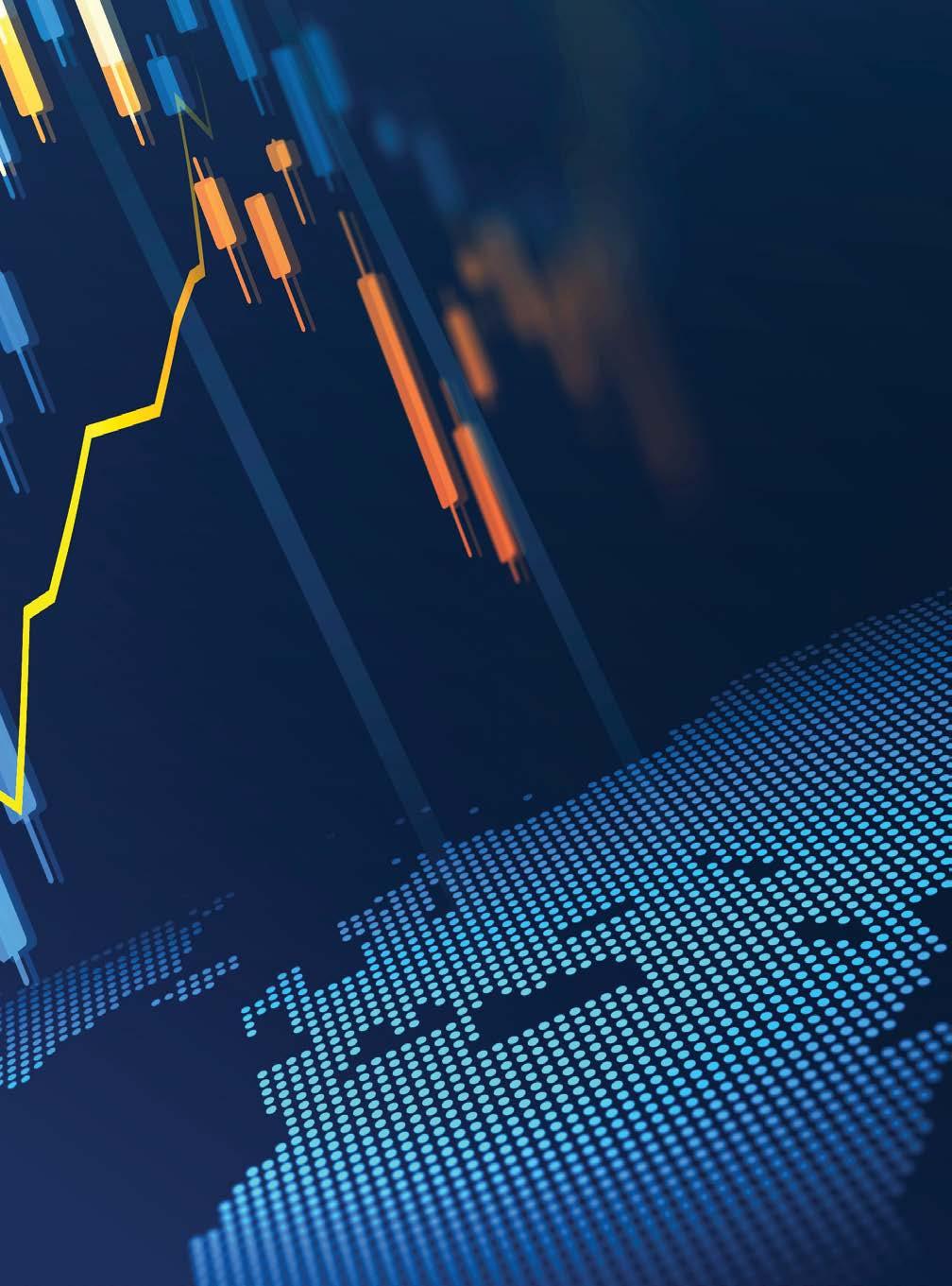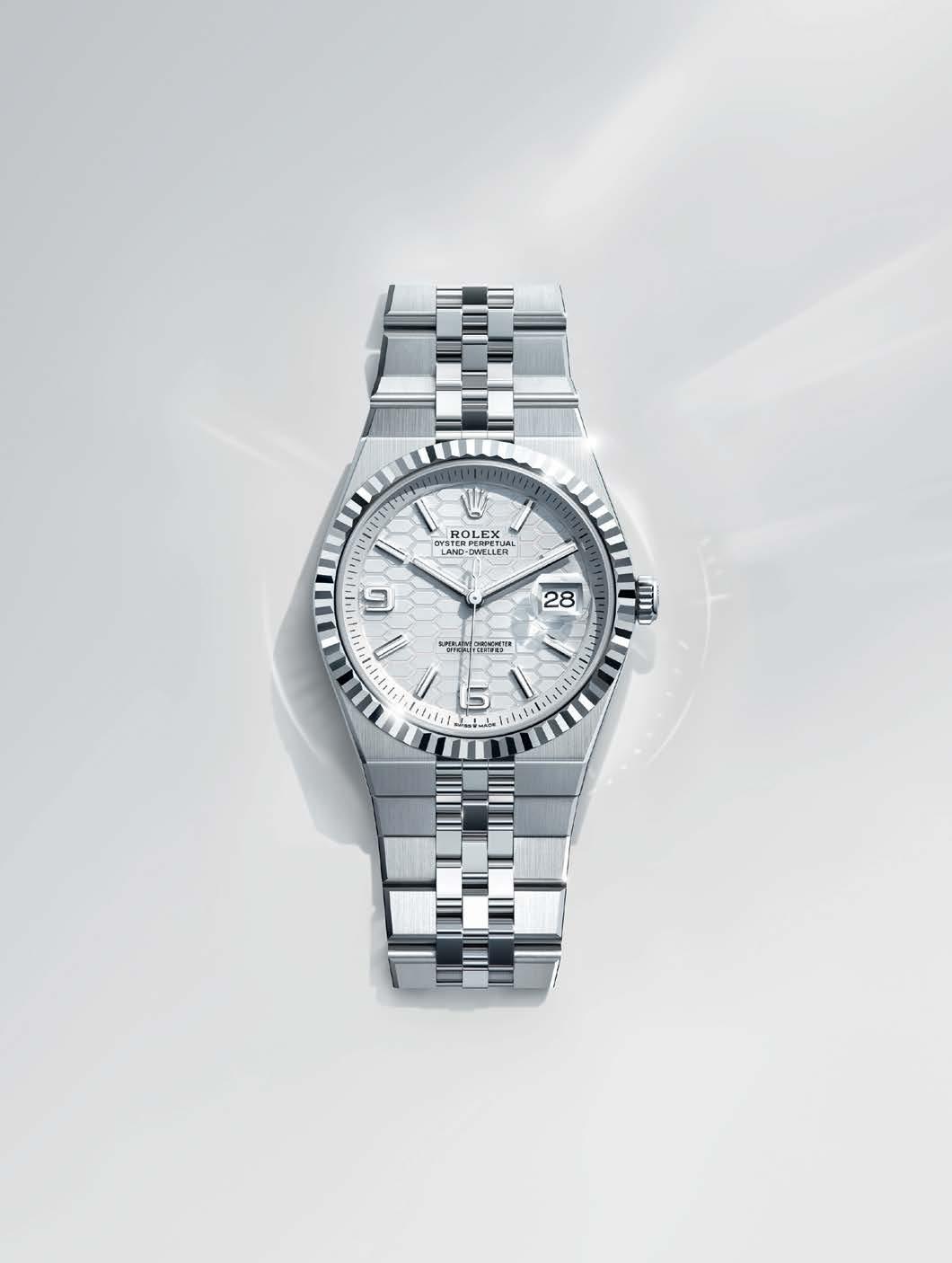




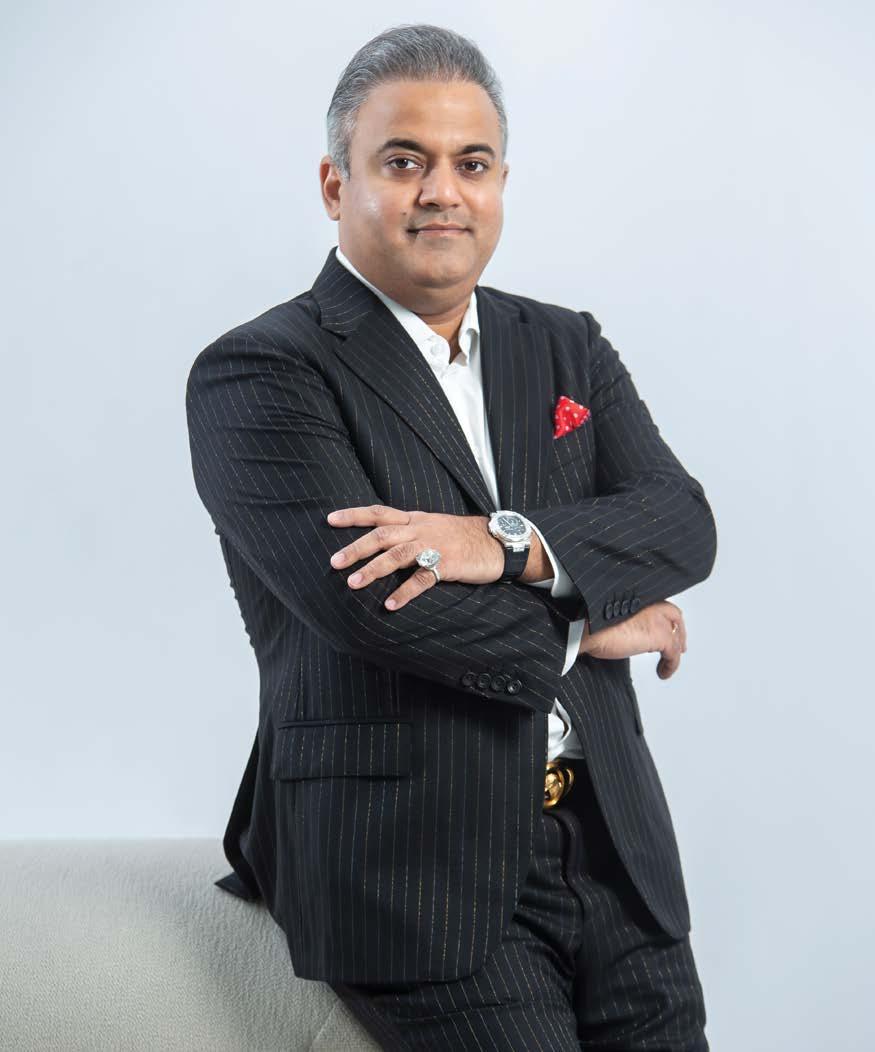
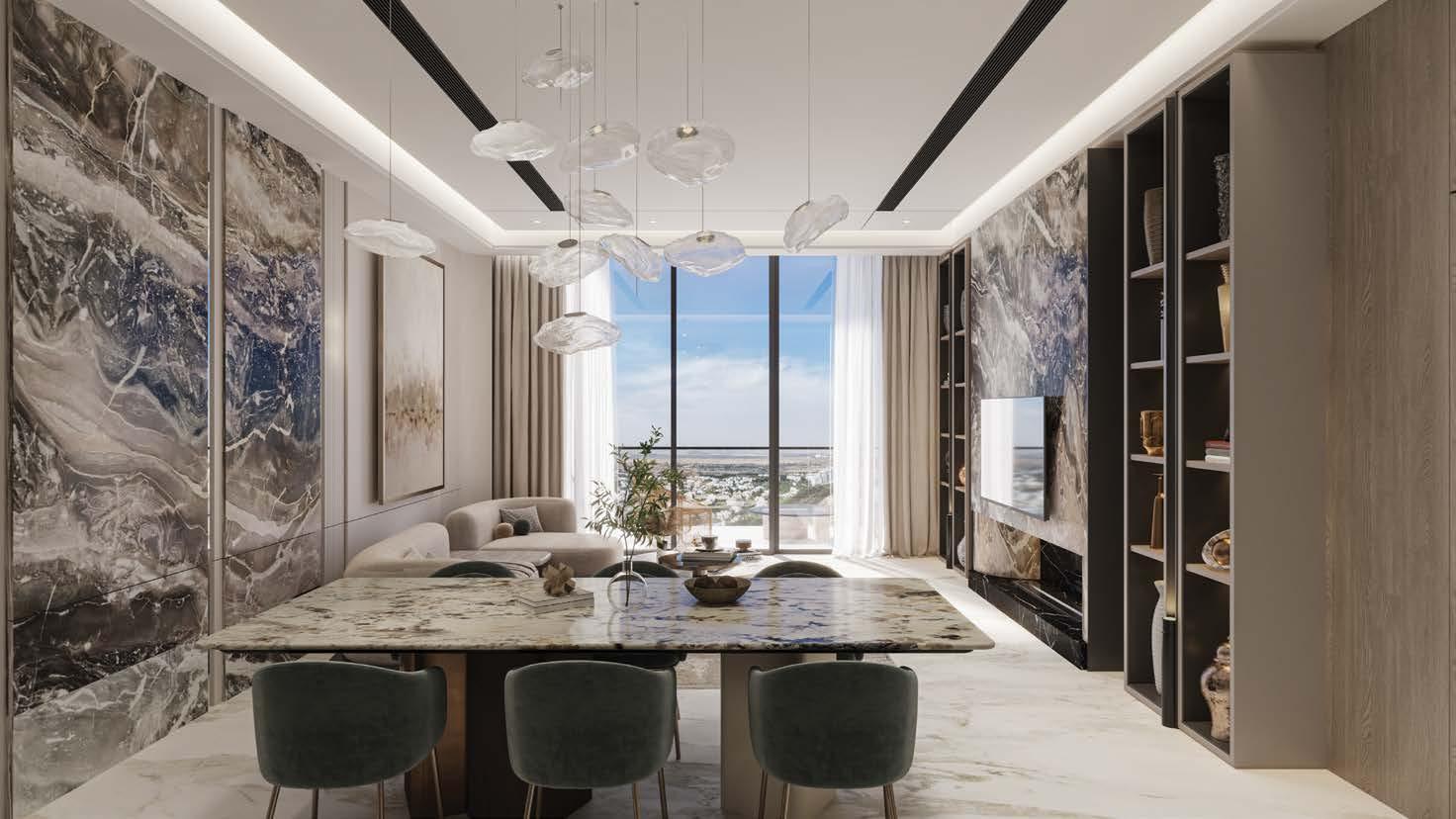


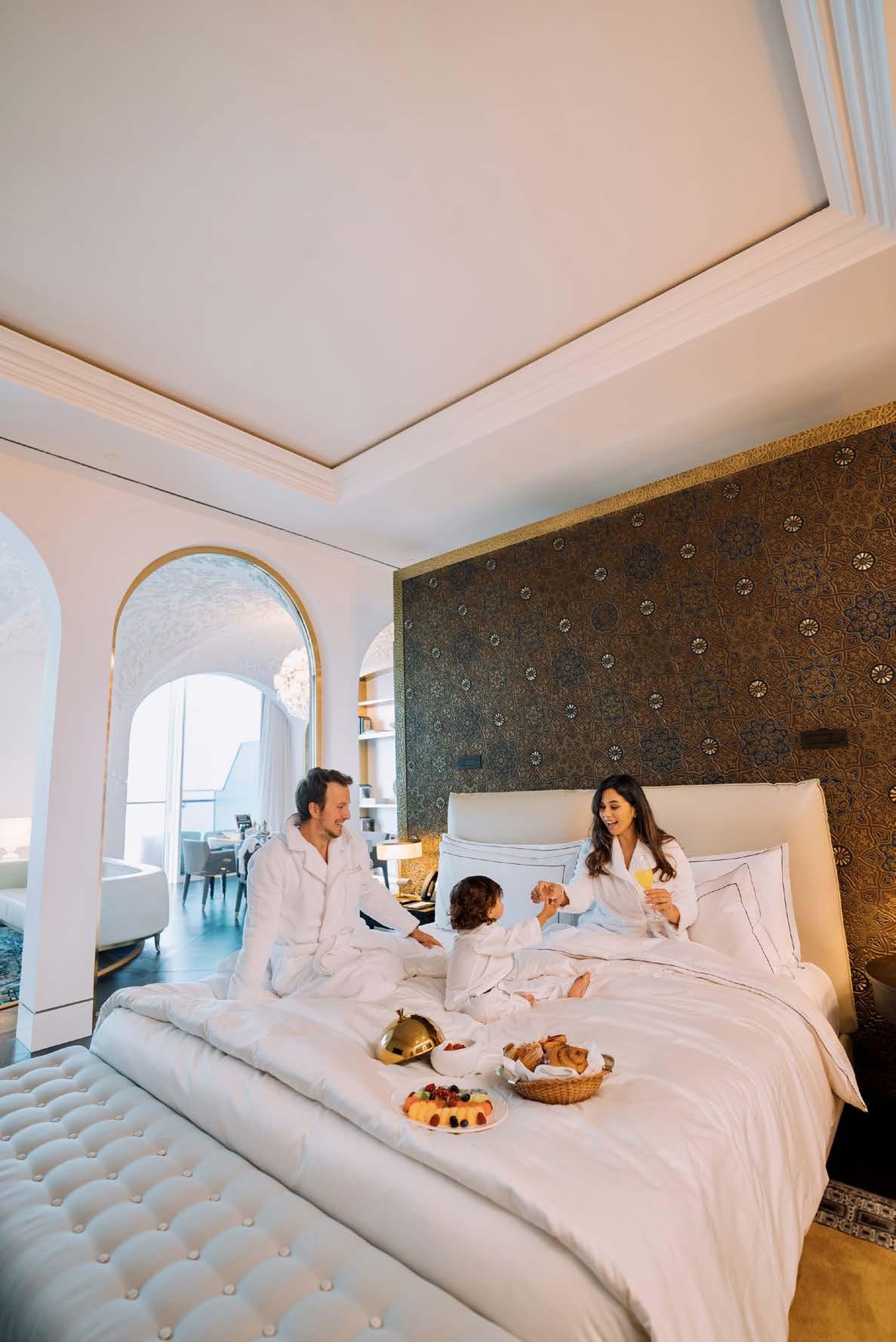













Step into a world of opulence when you book a Suite at Raffles Doha.
Experience the added luxury of QAR 750 credit to spend on dining in the hotel, and QAR 500 towards any Spa treatment.
Children aged 12 and below are welcome to indulge in the enchantment of complimentary dining.
Rates starting from QAR 3,500 per night
For reservations, please call +974 4030 7100 or email reservations.doha@raffles.com
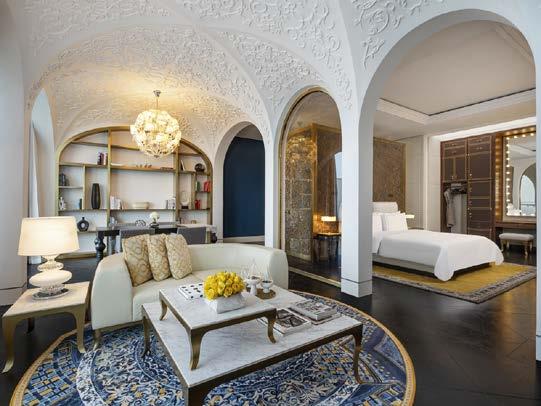
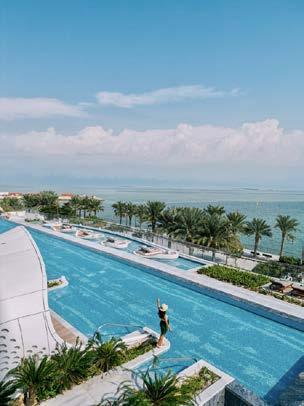
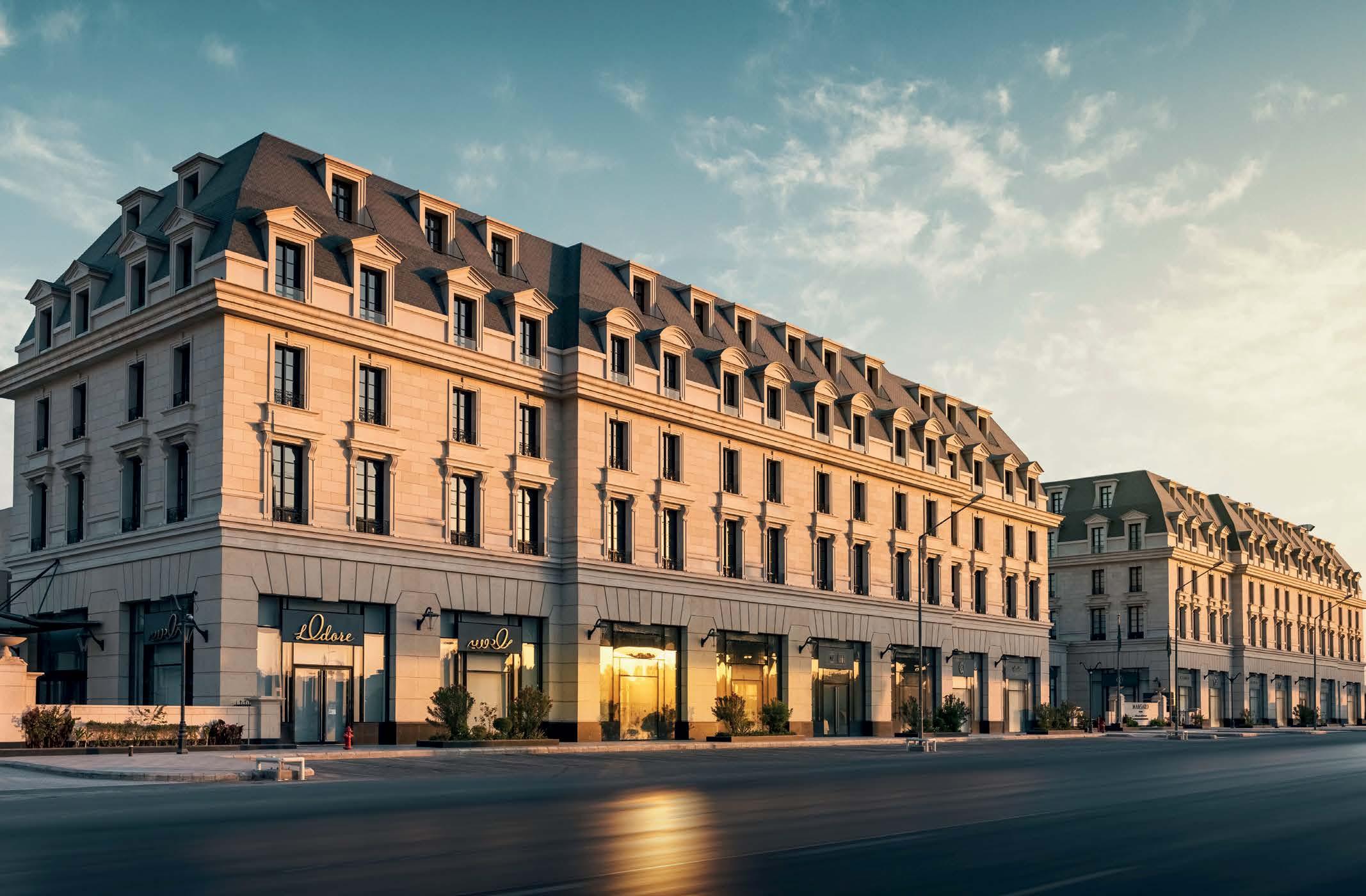



/July 1, 2025
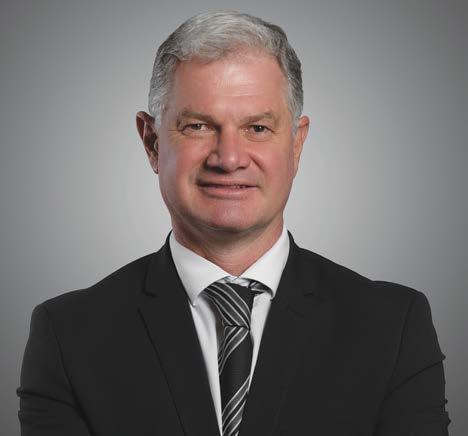
Lexus UAE.
CEO Wissam Younane wissam@bncpublishing.net
MANAGING DIRECTOR Rabih Najm rabih@bncpublishing.net
ART DIRECTOR Simona El Khoury
EDITOR IN CHIEF Anil Bhoyrul anil@bncpublishing.net
MANAGING EDITOR Tamara Pupic tamara@bncpublishing.net
FEATURES EDITOR Aalia Mehreen Ahmed aalia@bncpublishing.net
REGIONAL DIRECTOR Mahdi Hashemi mahdi@bncpublishing.net
DIRECTOR OF INNOVATION
Sarah Saddouk sarah@bncpublishing.net
GROUP SALES DIRECTOR – B2B GROUP Joaquim D’Costa jo@bncpublishing.net
P.15 Fueling the Next Wave
GAUTAM JAIN, Operating Member at SC Ventures, on helping accelerate the UAE’s digital ambitions.
P.28 The UAE Advantage
In becoming a brand ambassador of ONE Development, KEVIN O’LEARY reconfirms his belief that the UAE is a hotbed for innovation.
P.32 The Recap
Entrepreneur Middle East’s ‘LEADERS IN FINTECH’ AWARDS 2025.
P.40 Driven By Tomorrow
How JACQUES BRENT is pioneering Toyota and Lexus UAE’s electrification journey.
P.44 Rooted In Resilience
JASHANMAL GROUP CEO Shuja Jashanmal shares how the 106-year-old company has stood the test of time.
P.49 Future Forward
New VISA report shows GCC’s consumers favor biometric authentication over traditional card payment.
P.52
Lessons from the F&B sector from Pizza Hut Middle East & Pakistan GM BEVERLEY D’CRUZ
P.54 Forging Shifts
CEOs aren’t rockstars; stop paying them like they are, says NESR CEO SHERIF FODA.
P.64 Turning A Final Page Into A New Chapter
How GRACE KARIM and SOMIA ANWAR’S Bookends emerged stronger than ever after last year’s devastating April rains.
P. 70 Unlocking Real Estate
RAMI TABBARA, Co-Founder and CoCEO, Stake
HEAD OF PARTNERSHIPS Samir Glor Samir@bncpublishing.net
COMMERCIAL LEAD Anna Chipala anna@bncpublishing.net
COLUMNIST Tamara Clarke
CONTRIBUTING WRITERS
Ben Corrigan, Beverley D’Cruz, James Reynolds, Salil Kumar Malik, Sherif Foda, Tamara Clarke, and Fida Chaaban.
SUBSCRIBE
Contact subscriptions@bncpublishing.net to receive Entrepreneur Middle East every issue
COMMERCIAL ENQUIRIES sales@bncpublishing.net
ENTREPRENEUR.COM
Access fresh content daily on our website
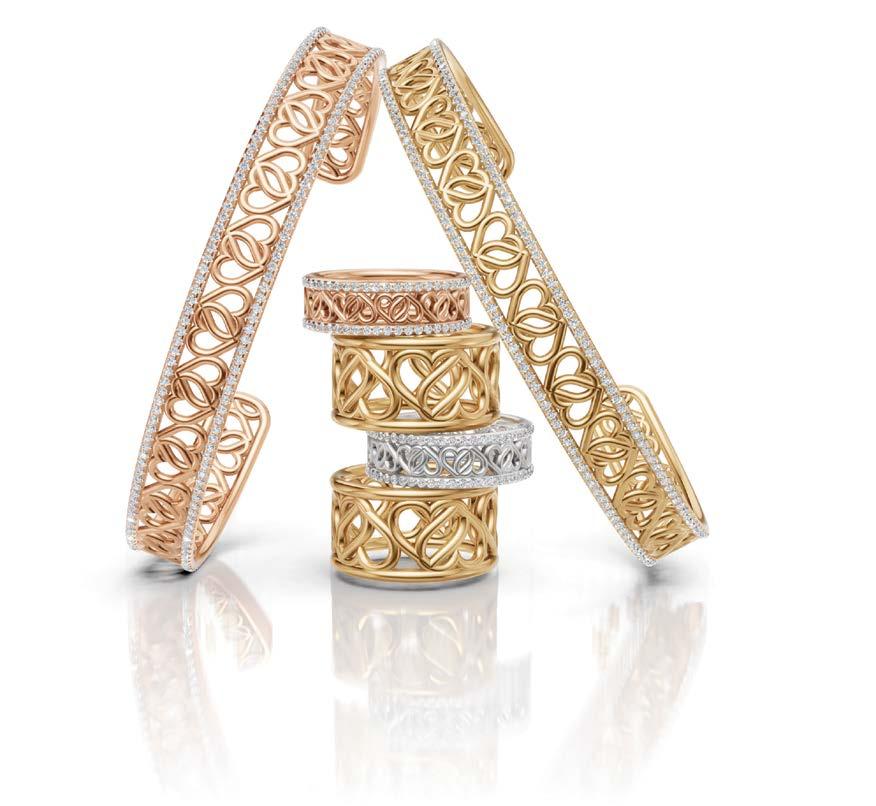
Enlighten Your Eternal Beauty, Inside and Out!
@muarjewels www.muarjewels.com
info@muarjewels.com
Opening a business bank account used to be a nightmare. Until now.

As most of our readers will tell you, the single hardest thing about starting a new business in the UAE is opening a business bank account. Most banks are stuck in the 70s when it comes to the process. Even some of the most impressive, technologically advanced banks (I won’t name them) find ways to complicate the process.
It usually takes at least six weeks to do so, an enormous amount of paperwork and endless visits to the bank in person. Even once set up, the process of actually activating an account, obtaining a cheque book and debit card, is equally horrendous. All this can hugely complicate the workings of any start up. Licenses need to be obtained – which require bank guarantees. Basic capital costs have to be met, usually through a founder’s personal savings and then recouped later.
Thankfully, this nightmare is now over – thanks to Wio Bank. ADQ and Alpha Dhabi are the primary shareholders with a combined stake of 65%, while e& holds 25%, and First Abu Dhabi Bank 10%. Between them, they have somehow managed to totally change the game for start-ups. The entire application process can only be done through an app, takes only ten minutes, and most accounts are both approved and active in less than 30 hours. Yes, you read that right – 30 hours. I challenge any of the traditional banks to even get the process done in three days – there is zero chance of them doing so. Three weeks at absolute best.
Just to be clear, I know all this because I recently opened a Wio business account. Apart from the incredibly smooth opening process, the actual operation of the account – and small things such as allowing multiple users that make a big difference – has been staggeringly good. Wio was only established with an initial capital of US$626.7 million. In May 2024, Wio Bank announced that it had achieved profitability in its first full year, reporting revenue of $72.6 million and a net profit of $545,000 in 2023.
It already serves more than 200,000 customers across Wio Business and Wio Personal.
More importantly, I believe it has completely changed the game. And that can only be a good thing.

Anil Bhoyrul Editor-in-Chief


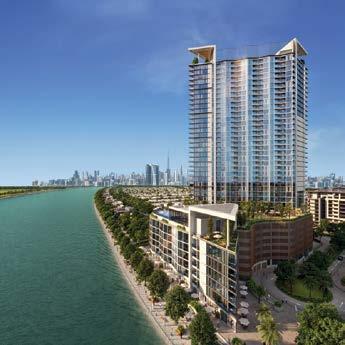


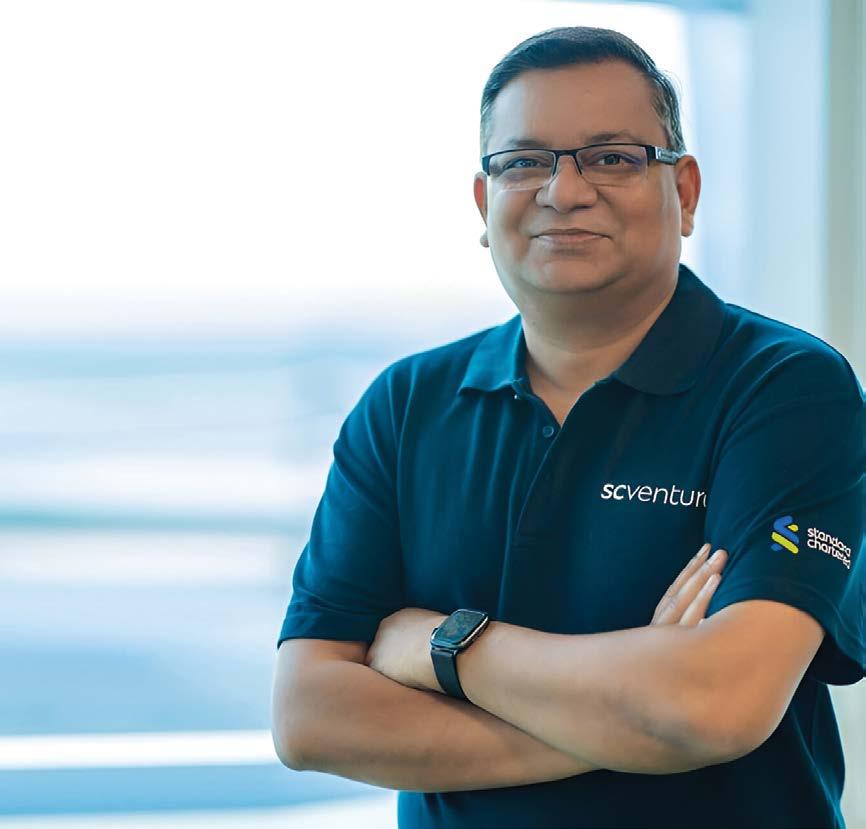
As the UAE strengthens its status as a global financial innovation hub, SC Ventures, the forward-looking innovation and venture capital arm of Standard Chartered Bank, has made a strategic move: launching an office in its capital, at Abu Dhabi Global Market’s Hub71.
“One year ago we set up our office in Dubai and Abu Dhabi and we are committed to contributing to and investing in the vibrant regional tech ecosystem – all while supporting UAE’s National Vision,” says veteran fintech strategist Gautam Jain.
Jain serves as the SC Ventures lead for the ADGM licensed office in Abu Dhabi located in Hub71. He also leads SC Ventures and SBI Holdings’ Digital Asset Joint Venture investment company established in the UAE that is aimed at tapping into the UAE’s momentum on digital assets. In particular, the joint venture will focus on developing market infrastructure, risk and compliance, DeFi, and tokenization use cases. “Notably, the US$100 million Global Digital Asset Holdings JV with SBI has made strategic investments in Twinstake, HiddenRoad, and WalletConnect reinforcing SC Ventures’ commitment to regulated digital asset innovation in the GCC,” Jain says. As a global venture builder backed
by Standard Chartered Bank, SC Ventures has already incubated 30 ventures, made more than 20 minority investments, attracted 20 co-investors in its ventures, served 662,000 individual and SME customers, and more than 200 institutional and multinational corporation clients. “SC Ventures is rewiring the DNA in banking and financial services to redefine banking’s relationship with society,” Jain explains. “We build and scale breakthrough ventures in and beyond banking.”
In the UAE, Jain explains, SC Ventures will make minority investments or build ventures under our three high-conviction themes:
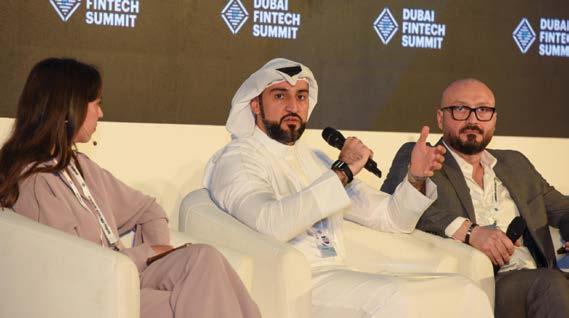
digital assets, digital banking and lifestyle, and trade and supply chains. The potential, Jain adds, is huge as he expects that the digital assets market cap will continue its growth trajectory, with tokenized assets alone growing to US$16 trillion by 2030. “When it comes to the digital banking and lifestyle vertical, we see that the demand for banking and wealth solutions is increasing with global financial wealth up 7% and US$18 trillion wealth transfer due by 2030,” Jain says. “Lastly, for the trade and supply chains vertical, we see a potential GDP growth of at least US$2.5 trillion if trade financing frictions are addressed, particularly impacting SMEs who represent >50% of OECD GDP but remain underserved.”
In achieving its goals, SC Ventures relies on a unique combination of its institution-grade processes and new technologies to build, commercialize and scale ventures that can succeed in regulated environments. “We typically build ventures when no existing solutions are available to meet client needs,” Jain explains. “Plus, we invest in existing solutions that can enhance the way financial services are delivered. Entrepreneurs can see problem statements on our Fintech Bridge, our platform that serves as a directory for fintech companies and clients and matches connecting relevant solutions to challenges. Fintech Bridge also serves as a real-time dashboard, allowing fintech companies to identify challenges shared in real time, enabling them to review their strategy or even update their solutions.”
Its operating model is backed by a proven venture-building model and fund investment experience refined since 2018, unique sourcing of original ideas through client co-creation, innovation platforms and intrapreneurship, and a strong network of business builders, operators, investors, and advisors across tech, regulation, and banking.
SC VENTURES IS REWIRING THE DNA IN BANKING AND FINANCIAL SERVICES TO REDEFINE BANKING’S RELATIONSHIP WITH SOCIETY. WE BUILD AND SCALE BREAKTHROUGH VENTURES IN AND BEYOND BANKING.”
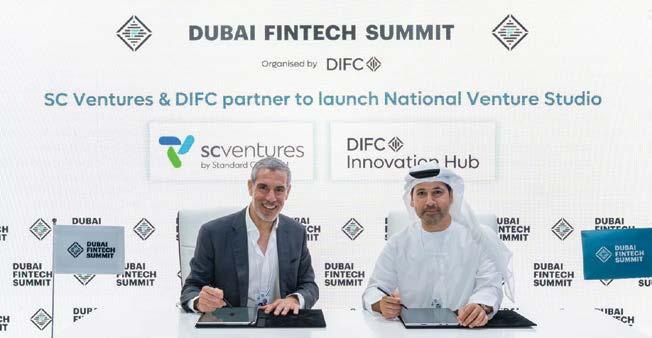
“At SC Ventures we don’t just invest, we co-design products and run lean incubators,” Jain says. “Rather than passively holding equity, SC Ventures acts as the nexus between Standard Chartered Bank network, other financial institutions, regulators and tech innovators. For example, we have recently facilitated and signed partnerships with Visa, Lulu Financial & 7X for one of our SME led ventures. In summary, we bundle capital, compliance expertise, and distribution, really supporting ventures accelerating time-to-market and growth. We also ensure that our ventures like appro, a digitized client onboarding platform (one of UAE’s top 100 startups) and myZoi, our award-winning financial
inclusion and financial literacy platform, are scaling rapidly and sustainably.”
Its impact is evident through its partnerships in the region- during the 2025 Dubai Fintech Summit in Dubai, SC
Ventures announced a partnership with the Dubai International Financial Centre (DIFC) to launch the National Venture Building Program. “As part of this collaboration, SC Ventures will be providing its Venture Building as a
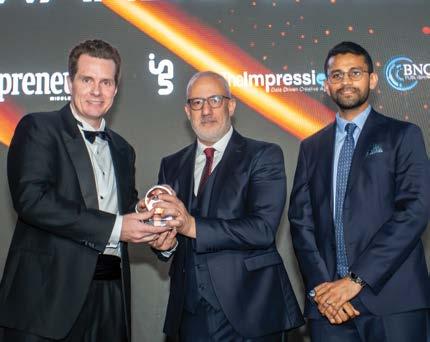
Jain
and beyond
} WE ARE EVOLVING HOW WE SERVE CLIENTS TO MEET THEIR NEEDS. With digital adoption in society outpacing the financial sector, there are many client segments to uncover and unmet needs to serve.
}WE ARE FACILITATING WORLD TRADES IN OUR MARKETS. Global trade is critical to enabling economic development particularly in emerging markets, yet supply chains and SMEs remain underserved.
}WE ARE BUILDING DIGITAL CAPABILITIES FOR FINANCIAL SERVICES. Despite innovation in financial services, current infrastructure does not deliver digital assets at institutional grade.
Service model to equip DIFC Innovation Hub with the tools, expertise, and frameworks required to operate and scale the initiative nationally,” Jain says. “We’ve also signed a memorandum of understanding with Emirates NBD to collectively power innovation in MENA, including potential co-creation and co-investment opportunities.”
Sartoro Geneve’s co-founder and CEO Arto Artinian on turning family craftsmanship into a global name in contemporary high and fine jewelry.
by TAMARA PUPIC
Born from the legacy of a humble family atelier, Sartoro Geneve has evolved into a globally recognized Maison of high and fine jewelry. At the helm are the two brothers Arto and Saro Artinian who have shaped it into a brand that blends heritage craftsmanship with contemporary creativity. In this conversation, Arto Artinian, co-founder
The Artinian family’s legacy in high and fine jewelry traces back to Arto and Saro’s father Souren and uncle Yervant who established a jewelry store in Damascus, Syria, in the 1950s, and insisted on using the world’s finest materials and stones for their collections. Built on these foundations, Sartoro Geneve was founded in Italy in 2001. “It felt like a natural continuation of what we knew - though it wasn’t without its challenges,” Arto says. “We learned the trade and the craft from the ground up—literally handling and sorting diamonds at a young age, working with our father, uncle and artisans in the family business. Starting Sartoro was our way of building on that foundation but adding our own perspective to it. We wanted to respect where we came from while creating something modern and forward-looking.”
In 2023, Sartoro Geneve marked a significant milestone in its journey as a luxury high jewelry brand: the company relocated its headquarters to Switzerland. Today, it has flagship boutiques in Geneva and Dubai, and a dedicated production team of 350 skilled artisans, conceptual artists, and designers in Le Locle, Switzerland, and Bangkok, Thailand. “In addition to our
and CEO, Sartoro Geneve, reflects on their journey from their childhood to the global stage. “My brother and I grew up surrounded by diamonds and craftsmanship, so it was always part of our DNA—but we noticed that so much of the luxury jewelry world felt distant, almost untouchable,” Arto says. “We wanted to bring something different: creations that tell a story, connect with people emotionally, and still reflect the highest standards of artistry and craftsmanship.”
“
STARTING SARTORO WAS OUR WAY OF BUILDING ON THAT FOUNDATION BUT ADDING OUR OWN PERSPECTIVE TO IT. WE WANTED TO RESPECT WHERE WE CAME FROM WHILE CREATING SOMETHING MODERN AND FORWARD-LOOKING.”
boutiques in Geneva and Dubai, we also have a strong partnership in Doha with Alfardan Jewelry and their strong client base,” Arto says. “Our upcoming boutique in Riyadh, set to open at the end of 2025, represents a key chapter in our continued regional expansion. Year-on-year, we’re seeing strong performance, particularly across the Middle East where demand for high craftsmanship and distinctive design continues to rise.”
At the heart of Sartoro’s allure are its fine and high jewelry collections which Arto describes as “more than jewelry but expressions of elegance, movement, and inner radiance.” He adds, “While our collections are inspired by the beauty of nature, art and rhythm of life, the final chapter is always written by the one who wears it. It is their essence, their presence, their story that gives each creation its true meaning.This is what makes Sartoro jewelry deeply personal-and profoundly timeless.”
Speaking about the Maison’s creative process, Arto says it is a
collaborative and meticulous journey. “It starts with an idea—a form, a feeling, a spark of inspiration, or even a client’s story,” he explains. “Our designers sketch it out, refine it digitally, and we handpick every stone, always looking for the best cut, color, and character. From there, our artisans— many of whom have decades of experience—bring the piece to life using traditional techniques with a modern twist and the utmost precision. It’s not unusual for a single piece to take hundreds of hours. It’s a process of patience and creativity.”
At Sartoro Geneve, the harmony between tradition and innovation is the brand’s defining essence which is especially evident in its celebrated collections Trilogie, known for its bold, architectural beauty and innovative diamond cuts, and Dualité, beloved for its harmonious fusion of contrasting elements. “Tradition gives us a foundation—we use techniques passed down through generations—but we also embrace modern technology and advanced setting tech-
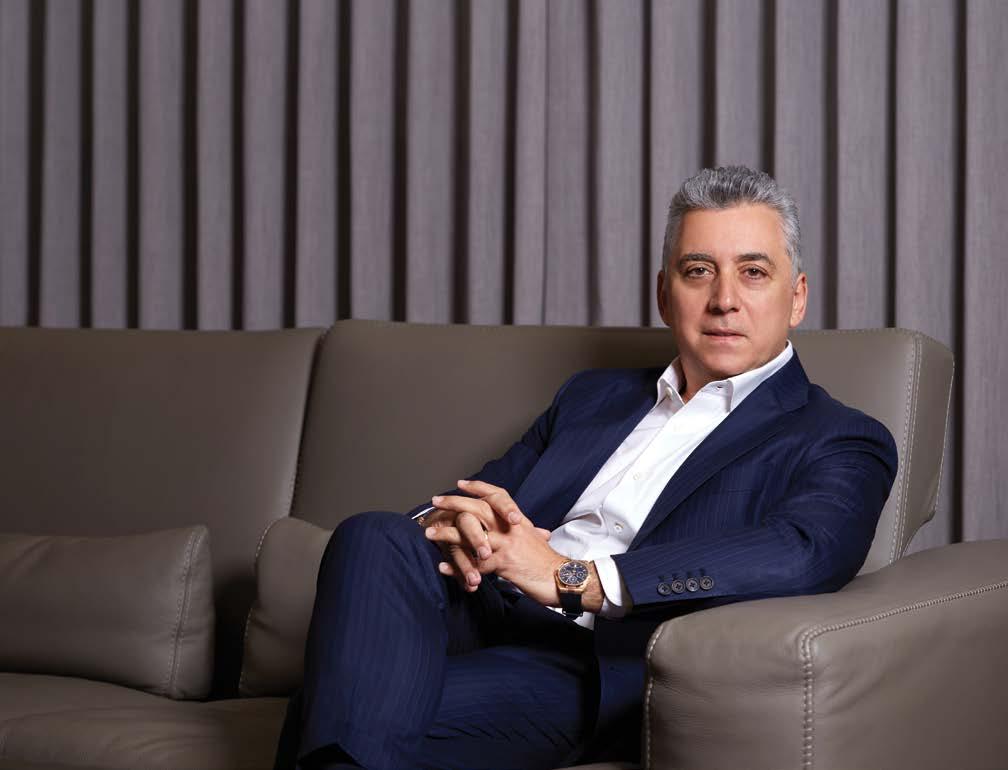
“
BY THE ONE WHO WEARS IT.”
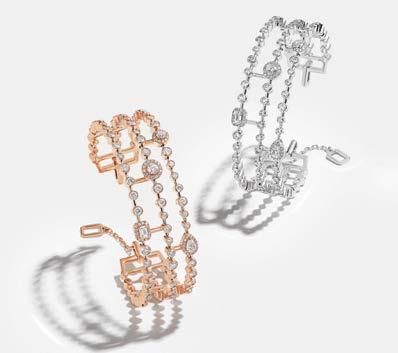

niques. It’s not about replacing craftsmanship, it’s about enhancing it,” Arto explains. “Innovation allows us to be more daring with design while still respecting the art form. However, ultimately, we always rely on the human touch to bring warmth and character to each creation. That balance is what makes Sartoro truly stand out.”
The core philosophy of Sartoro Geneve, Arto continues, is to design jewelry for confident, expressive individuals. “It’s a matter of nuance, not compromise. Sometimes that means bolder colored gemstones or more intricate designs, but it’s always Sartoro at the heart.”
In his opinion, today’s luxury consumers are looking for meaning, connection and authenticity. “People want more than a beautiful product—they want to understand the story behind it, how it was made, and who’s behind the brand. There’s a shift toward conscious luxury: quality, transparency, storytelling and personal relevance matter
more than ever,” he says. In fifty years’ time, Arto hopes that Sartoro Geneve will be seen as a Maison that stayed true to its values of craftsmanship, heritage, creativity, and always individuality. “We would like to envision it as a brand that evolved with the times but never lost its essence. Ideally, our creations will still be worn, gifted, and passed down—each one carrying stories across generations,” Arto Artinian concludes.
Sartoro Geneve’s co-founder and CEO Arto Artinian Advises Entrepreneurs in the Jewelry Sector
}CREATE A VISION WITH PURPOSE. “Be clear on why you’re doing this. That clarity will help you navigate tough decisions and keep your work authentic.”
}MASTER YOUR CRAFT. “Understand materials, techniques, and what makes great and long-lasting jewelry— because design without skill is just decoration.”
}BE PATIENT AND STICK TRUE TO YOUR VALUES. “Success doesn’t happen overnight. So-called trends will come and go, but if your work is authentic and wellcrafted, people will always connect with it.”
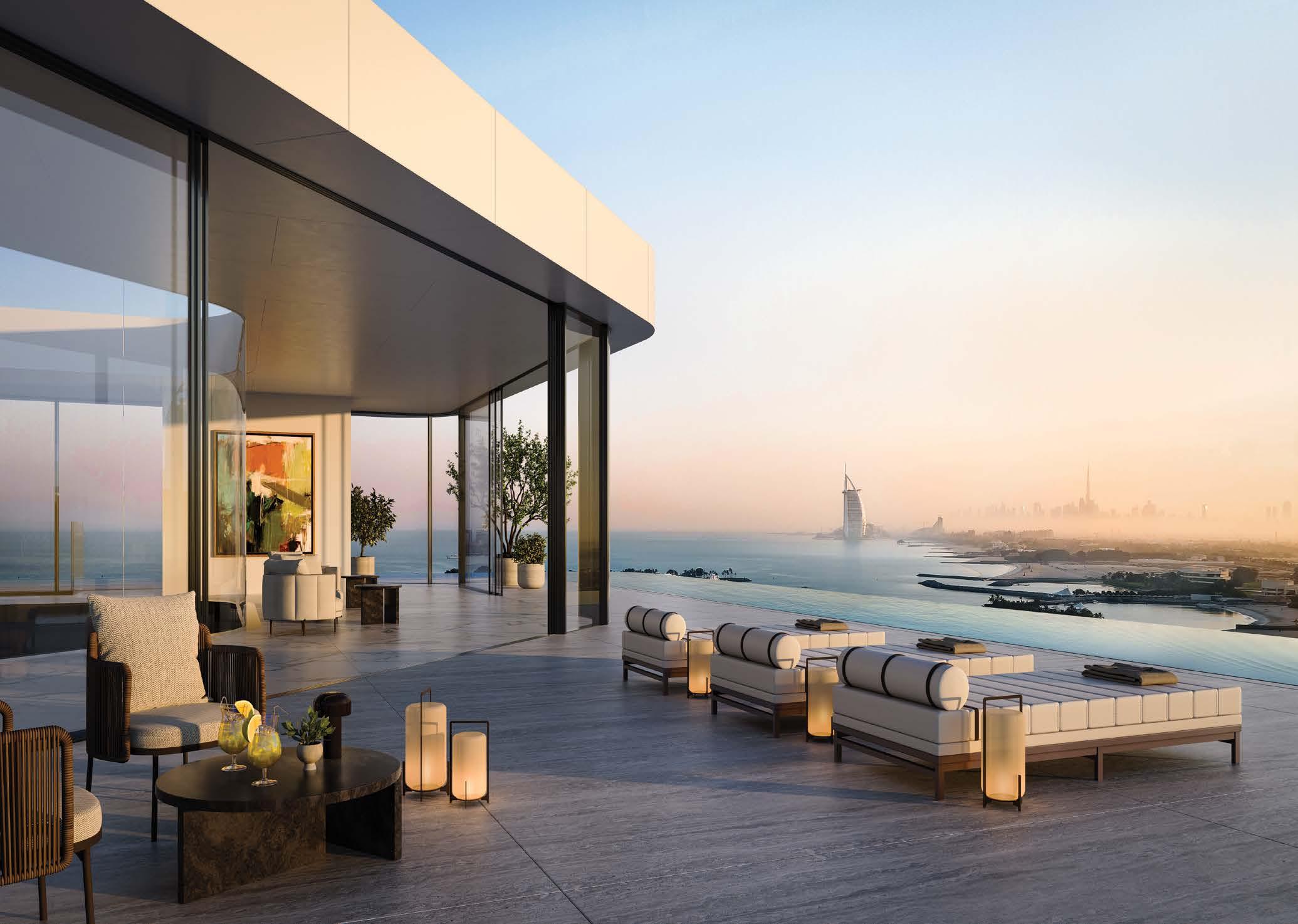

→ Ashish Vijay is a Dubai-based investor, philanthropist, entrepreneur, and businessman with decades of experience in the precious gemstone and luxury jewellery industry, finance, and investment sectors. He is the founder and CEO of UAE-based business conglomerate AV Group.
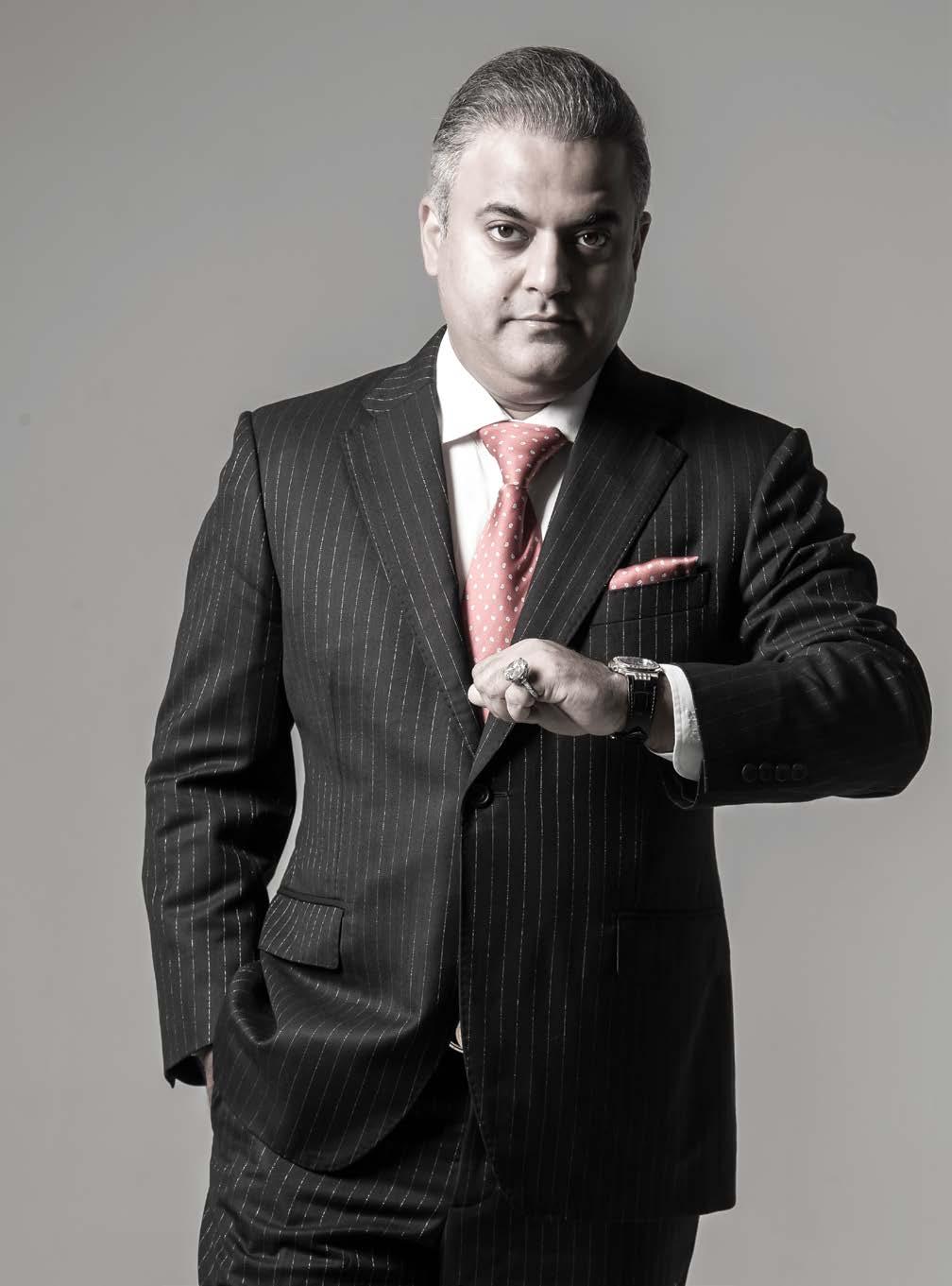
With his expertise extending into the worlds of entrepreneurship, investments, and philanthropy, AV Group Founder and CEO Ashish Vijay is betting on the values passed down through the generations before him to imbue ethics and longevity in all his endeavors.
by AALIA MEHREEN AHMED
TThere seems to be a common behavioral combination that exists among most new generation family business leaders: a deep seated desire to honor the traditions and values that have built the companies they helm, and a vigor to introduce the right innovations to grow their business impact. It is this sentiment that is evident in the work of (and, indeed, the interview responses from) Ashish Vijay, the founder and CEO of AV Group, a UAE-based business conglomerate primarily renowned for its luxury jewelry products. After all, it was his grandfather who, in a newly independent India in 1948, set up a gemstone trading business in the capital city of New Delhi. “I’m here to protect what came before me and explore what’s possible next,” Vijay says. “Leading a company that has a successful legacy of more than seven decades is a big responsibility, but also something I’m proud of. The legacy of our family, which began in 1948 when my grandfather first embarked on his lifelong passion for gemstones, was carried forward by my visionary father, Vijay Kumar Jain. Guided by an innate love for the craft and an unwavering commitment to authenticity, my father laid the foundation for what would become a revered name in the world of precious stones. It is this passion and dedication I aim to honor and respect. This company was built on strong values and a long history. My job is to respect that legacy while also taking things forward.”
So far, Vijay has stayed true to his promise. Under his leadership, AV Group –which eventually shifted its headquarters to the UAE over the years– has gone on to operate in a number of other industries including financial investment, social impact and real estate. But for the founder, it was an imbibed love for gemstones that marked his initiation into the world of business. “I didn’t really choose this path—it was always around me,” he says. “I grew up surrounded by colour and sparkle. For me, gemstones weren’t just beautiful objects; they had life, energy, and meaning. Even as a child, I felt connected to them. So it was never a question of “if,” just “when.” From very early on, I knew this was what I was meant to do.”
That initial spark of interest has continued to ignite Vijay’s passion, with AV Group today having three distinct verticals for its gemstone offerings. The first of these is Meraki by Tiara Gems, a store that offers everyday jewelry that is both classic and wearable. Ranging from a modest AED600 to a high-end pricing of AED12,900, the brand offers pieces made of diamonds as well as precious stones such as ruby, emerald and sapphire. While a physical Meraki by Tiara Gems store is located at the Dubai International Financial Center (DIFC), the designs can also be purchased via its online platform. The second is AV by Ashish Vijay. “This is our most exclusive line, and offers one-of-a-kind pieces with rare stones like red diamonds, Cashmere sapphires, and more,” Vijay explains.
The third vertical is perhaps the most pristine of the lot– AV Globale, a B2E global auction platform that engages gemstone enthusiasts, manufacturers as well as producers of gems and jewels. For its Dubai-based auctions, the entity has forged a formidable partnership with the Dubai Multi Commodities Centre (DMCC). “AV Globale connects serious collectors directly with top-tier gemstones and jewellery, whether rough, polished, or custom-made,” Vijay adds. “Our clients appreciate rarity, meaning, and quality. They don’t just buy jewellery—they invest in pieces that tell a story.”
→ For over 77 years, the AV family legacy has been synonymous with excellence in diamonds, fine jewelry, and high-value collectibles.
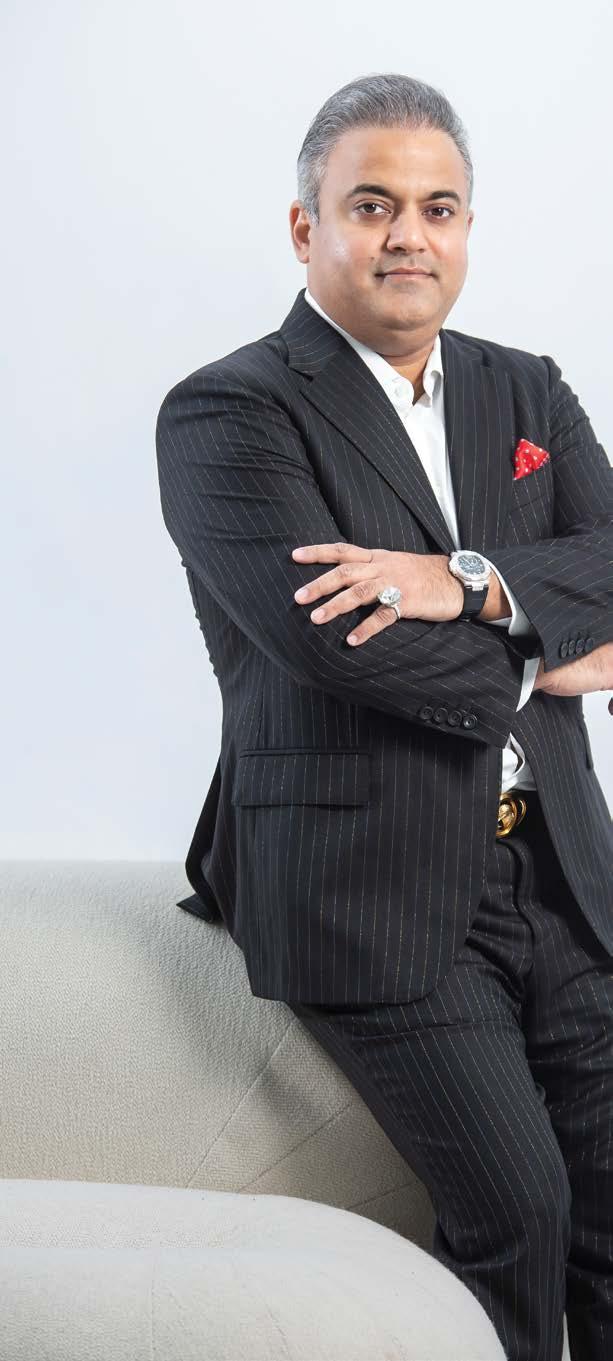

Now, Vijay’s belief in the ability of ornaments to narrate a tale isn’t some spiel to garner attention– it clearly stems from his own connection with precious stones. So deep rooted has his drive to curate the best collections for AV Group been, that the founder often gets directly involved in the sourcing and selecting of stones for the brand’s designs. “I believe every gemstone has a story, and you can only understand that if you work closely with it,” he says. “I personally choose every important stone because it’s not just about quality— it’s about finding the right match between the gem and the person. That care and attention shows in the pieces we create. It’s what makes them special.”
Vijay’s dedication to his craft received a major external nod of approval when, in early 2023, he joined the board of the International Colored Gemstone Association (ICA) and was given the role of
“
} My father has had the biggest influence on me. He didn’t just hand over the business—he passed on the values that built it. He always said, “The bigger the risk, the bigger the reward.”
ICA Dubai Chapter’s Director. “Through my role at ICA, I’ve been able to promote coloured gemstones more widely in this region,” Vijay notes. “We’ve built new connections and partnerships to bring more attention to this side of the industry. It’s been a privilege to help position Dubai as a hub for rare gems. Dubai has given us the perfect foundation to grow—great infrastructure, strong leadership, and global reach.”
Indeed, the UAE’s gems and jewelry market has been silently proving its mettle as an economy booster, with a report by US-based management consulting platform TechSci Research showing that the industry stood at US$8.34 billion in 2023 and is anticipated to grow with a compound annual growth rate (CAGR) of 6.84% between 2025 and 2029. Vijay and his team thus hope to create their own distinct mark in the market through the creation of jewelry items that are created with intent. “We don’t follow trends just to stay current,” Vijay declares. “Instead, we focus on timeless designs that connect with people. Our work combines global influences with rare materials. We also use technology to improve craftsmanship and offer a smooth experience—but always in a way that supports the heart of the piece, not distracts from it.
But the same aforementioned report —which highlights that the UAE’s strategic location as a global trade hub, its tax-free environment, tourism, and multicultural population have been key drivers in the industry’s steady rise— also notes that a global lack of ethical practices has been detrimental to achieving sustainable growth. One such area of ethicality has been the treatment of small-scale miners, who face issues ranging from unfair working treatment to lack of market access. For Vijay, ensuring a more equitable ecosystem in this regard has been paramount. “At AV Group, we work closely with small-scale miners because they’re a crucial
→ The UAE’s global connectivity, leadership, and booming ecosystem has enabled Vijay to elevate AV Group to new heights, setting new benchmarks in the industry.
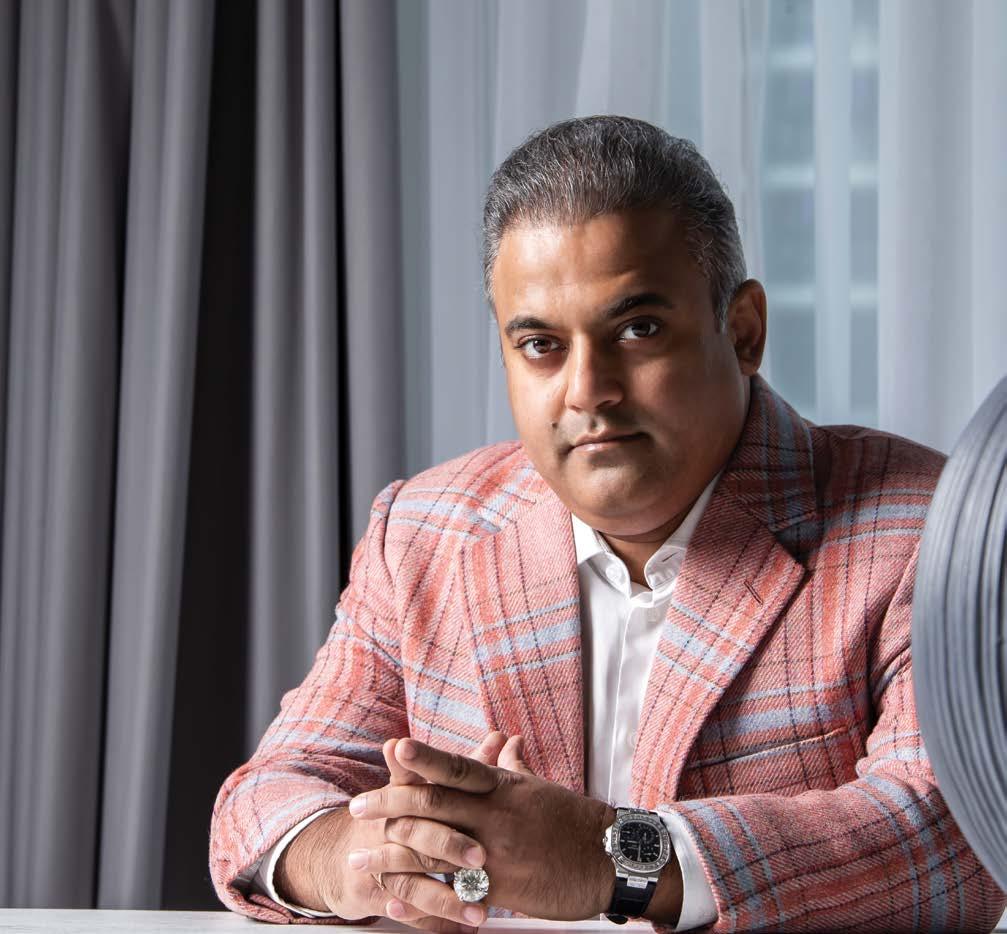
part of the gemstone world,” he shares. “Many of them don’t have access to fair pricing or stable income. So we help by offering financial support and giving them direct access to our Dubai auctions. This gives them a better chance to grow—and helps us build a more honest and sustainable supply chain.”
Vijay’s drive to create a more transparent industry is deeply interlinked with his philanthropic
efforts– something he mentions has “always been close to my heart.” As such, one major initiative in this regard has been Gems of Hope- a program that directs resources toward critical medical aid and research. In 2025, through a partnership with India-based Tata Memorial Hospital and AIIMS Delhi, the program has also redirected its funds specifically towards cancer care and research. “Philanthropy is not just something we add on—it’s part of how we run the business,”
Vijay says. “Through Gems of Hope, we support children’s education, healthcare access, and environmental efforts. It’s our way of giving back with purpose. For me, true success includes helping others rise with you.”
It is perhaps this mindset that led Vijay into the field of financial investments as well. In 2016, he set up Seiko Financial Services in Dubai to support businesses ranging from grassroots ventures to global startups, with a special focus on

“ }
Philanthropy is not just something we add on—it’s part of how we run the business. Through Gems of Hope, we support children’s education, healthcare access, and environmental efforts. It’s our way of giving back with purpose. For me, true success includes helping others rise with you.”
empowering womenled enterprises. There is AV Investment Funds, a new initiative aimed at maximizing investor earnings while expanding opportunities in high-value assets. “AV Investment Funds allows people to invest with us in a range of areas—rare gemstones, real estate, and renewable energy,” he explains. “But it’s about more than financial returns! It’s about building trust, longterm value, and creating opportunities that benefit everyone involved.”
Vijay and AV Group’s move into the booming realm of real estate has also led to the launch of AV Real Properties (AVRP), a real estate innovation platform aimed to cater to the growing number of property buyers in the nation. “We will soon be launching new initiatives through AVRP which will focus on fractional ownership,” Vijay reveals. “This model makes it possible for more people to invest in carefully selected, high-value properties. It’s a step toward more inclusive, transparent ownership—something we deeply believe in.”
But that isn’t all Vijay has in the pipeline. “We’re entering an exciting chapter,” he declares. “Over the next 12 to 18 months, our focus is on expanding AV Group across key areas—real estate, investment, and impact.
AV Investment Funds will continue to grow across sectors like clean energy, rare gemstone portfolios, and legacy real estate. But for us, it’s not just about financial performance— it’s about building long-term ecosystems built on trust and value. On the impact side, our Gems of Hope initiative remains close to our heart. The new projects focus on cancer care and critical treatment access for underserved communities—causes we are deeply committed to. And, as always, we’ll also be unveiling new collections, exploring new mines, and investing in technologies that help us evolve while staying true to who we are. The future for us is about more than growth—it’s about meaning, inclusion, and legacy.”
As Vijay gears up for this new phase of growth and innovation, he remains grounded by the advice he received from his predecessor–his late father, Vijay Kumar Jain. “My father had the biggest influence on me and always will,” Vijay says. “He didn’t just hand over the business—he passed on the values that built it. He always said, “The bigger the risk, the bigger the reward.” But more importantly, he believed in trust, transparency, and tradition. These are the values I still follow, and they’ve become the foundation of how we run AV Group today and will continue to!”
In becoming a brand ambassador of UAE-born international boutique real estate company ONE Development, Kevin O’Leary reconfirms his belief that the UAE is a hotbed for innovation, business and global finance.
by TAMARA PUPIC
KKevin O’Leary, known as Mr. Wonderful, is a Canadian entrepreneur and international business investor. But now, O’Leary is also the brand ambassador of UAE-born international real estate company ONE Development.
Forming a strategic partnership with Ali Al Gebely, founder and Chairman of ONE Development, O’Leary will support the company’s international expansion
“When I met Ali [Ali Al Gebely] and learnt
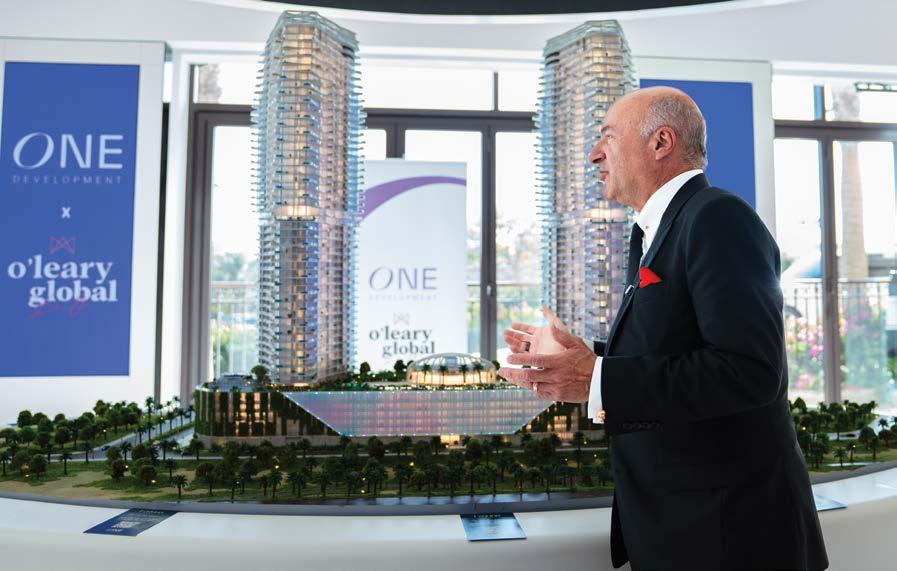


WHAT SETS ONE DEVELOPMENT APART IS ITS UNAPOLOGETIC FOCUS ON TECHNOLOGY. THIS ISN’T JUST ANOTHER REAL ESTATE DEVELOPER — IT’S THE FIRST OF ITS KIND TO FULLY INTEGRATE A TECH-FIRST APPROACH INTO EVERY STAGE OF DEVELOPMENT. FROM AI-DRIVEN DESIGN MODELING TO DATA-POWERED DECISION-MAKING, THEY’RE NOT JUST BUILDING PROPERTIES — THEY’RE BUILDING THE FUTURE OF HOW REAL ESTATE OPERATES.”
about his vision for Laguna Residence [an AED 2.4 billion real estate development that is the UAE’s first AI-integrated residential community], I thought it was such an extraordinary idea,” O’Leary said on the sidelines of an exclusive event organized by ONE Development. “I’d never heard anybody combining an AI platform into a real estate development. Usually AI is just a marketing talk. We’ve talked about smart homes for over 15 years, but they are still pretty dumb. There are five different apps that you have to use when you walk into your apartment or villa, but the idea he’s got is to put it all into one integrated app - ONE AI App. In my view, that in itself is the number one selling feature of the whole project.”
“What sets ONE Development apart,” O’Leary explains, “is its unapologetic focus on technology. This isn’t just another real estate developer — it’s the first of its kind to fully integrate a tech-first approach into every stage of development. From AI-driven design modeling to data-powered decision-making, they’re not just building properties — they’re building the future of how real estate operates.”
O’Leary will be supporting the remarkable growth trajectory that is ahead of ONE Development which includes expansion to international destinations, but also developing unique initiatives, such as DO Hotels, the world’s first musicalthemed hotel that integrates AI, music, and wellness. DO Hotels launched its first
development at Dubai Islands and second one at New Cairo and has plans to launch in Saudi Arabia and other international markets soon. “I have a very simple rule that my mother taught me. She said no more than 5% in any one stock and no more than 20% of your portfolio diversification in any one sector. So 5% stock, 20% sector, except for one asset class - real estate,” O’Leary points out. “That’s my largest asset class. I love real estate. It’s always about a third of my net worth. Why? It’s a hard asset. It has superlative returns, and if you have the right vision in terms of where you want to develop, you can have outsized returns, because great real estate projects, such as ONE Development, attract capital because they get
IT’S LIKE NEW YORK CITY ON STEROIDS, BUT SAFE.”
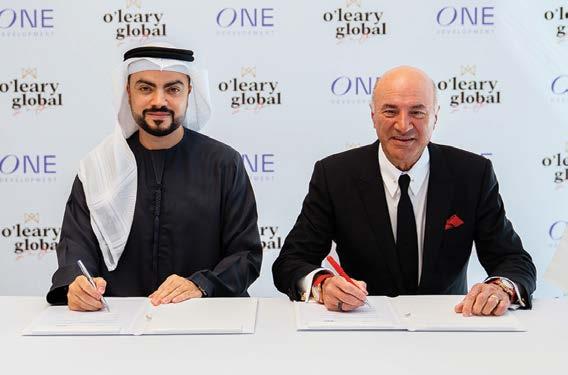
critical mass. That’s what happens.”
The partnership with ONE Development reconfirms O’Leary’s belief in the MENA market’s long-term potential. “I have a history in the Middle East because my mother’s Lebanese, and I’ve been coming here for decades, but I didn’t really think much about investing here until I started to realize how fast the economy was growing here,” O’Leary says. “The key here that most investors don’t understand, the one thing they don’t get, is that so much growth is not in energy. There’s been a lot of sectoral diversifications here in all kinds of different technologies, advances in biotech or in AI development or in real estate. You want to catch the growth of all these new sectors. A lot of people don’t realize that, for example, if you look at spending in AI, you’ve got the US, China, and then UAE. That’s what’s going on here, and if
FOR ME, I HAVE BECOME AN AMBASSADOR TO THIS PLACE BY SAYING, LOOK, IF YOU’RE NOT IN THE UAE, YOU’RE MISSING OUT.”
you’re not part of that, you’re missing out on huge growth opportunities.”
In 2023, O’Leary announced on his LinkedIn page that he had become a citizen of the UAE, a citizenship given by exception to people who are believed to be able to benefit the UAE economy.
“There’s a lot of disruption going on in global trade, but that gives you a reason to start looking at the UAE,”
O’Leary says. “You can’t understand it unless you physically come here and spend time here and find out who else is here and what’s going on. Because no brochure, no online ad, no website is going to give you an idea of what’s going on here- it’s multicultural, a melting pot, a fantastic location. And the country is safe. I was like, why don’t I incorporate here and start building businesses out of here? Why not think globally from here? Why not set up O’Leary Global and start doing new ideas from here and establish myself here? That’s what I have done over the last three years.” He adds, ”What was really interesting about the process is that every single accounting firm, consulting firm, and law firm that I use in New York, or Boston, or Toronto is already established here. They’re not stupid. They know exactly what’s going on. So I can use the same team out of Miami and talk to professionals here that are part of the same group, which we’ve done.” “I’m like everybody else,” he continues. “You start in New York, then you go to London, then you go to Zurich, then you go to Geneva. That’s the stepping stones of how you start to develop internationally. Then one day you get here and you walk off the plane and go, ‘What is this?’ Until you see it, you can’t even envision it. I have watched the growth of both Abu Dhabi and Dubai in the last five years. It’s almost geometric growth. It’s like New York City on steroids, but safe.
“For me, I have become an ambassador to this place by saying,
Kevin O’Leary’s Advice for Entrepreneurs
} DON’T BE AFRAID TO START
“Most entrepreneurs have a hard time making the first step to start. They should do it in their 20s, because that is when you have time and you don’t have as many responsibilities, and you can make plenty of mistakes, which is great. I would rather invest in an entrepreneur that has felt the sting of failure a few times than one who thinks they can do it right the first time. They never can. It is so hard.”
} PREPARE YOUR PITCH
“Learn to articulate the opportunity in 90 seconds or less, because no one is going to give any more time than that.”
} FOCUS ON EXECUTION
“More important than a great idea is your ability to execute on it. Because great ideas are a dime a dozen. Executional skills are very hard to find. If you can find a young man or woman who looks and has the confidence to execute, that makes me interested in investing.”
} KNOW YOUR NUMBERS
“You have got to know your numbers. How fast is the market growing? What are the gross margins? How many competitors are there? You got to know that stuff. That is the DNA of a great entrepreneur. Then obviously, you want to be in a market that is growing. It is like all boats rise in a rising tide, and so try and find regions of the world where businesses are being started in a high growth environment like here. There is a reason entrepreneurship is so prevalent here. The regulatory environment is very good. The tax rates are really competitive. The weather is great, and the economy is growing at an extraordinary rate because it is multi sectoral. I predict pretty good things for this place.”
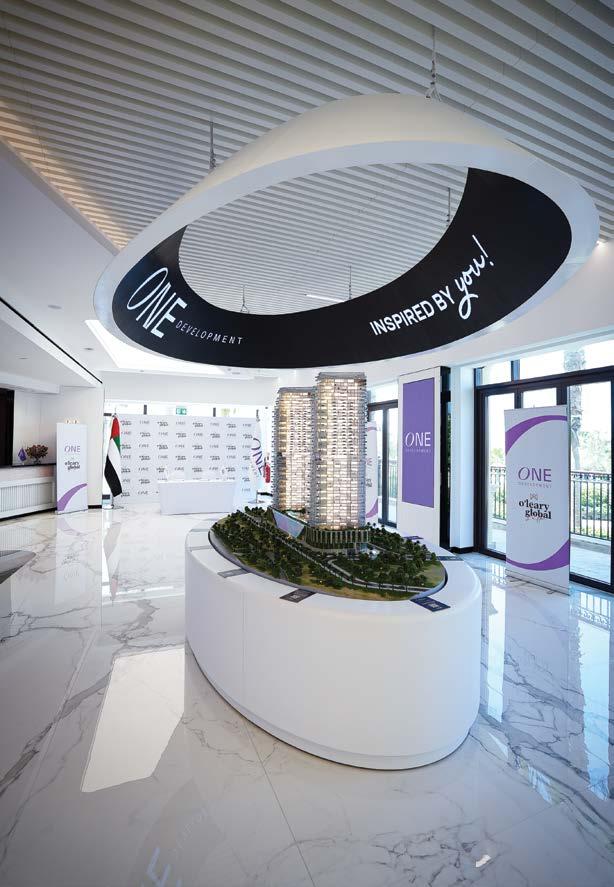
look, if you’re not in the UAE, you’re missing out.”
Apart from investing in real estate, O’Leary is bullish on new technologies, including cryptocurrencies. “I have been extremely involved as an investor in many different crypto projects, and my thesis is that you want to own the infrastructure for crypto. What are those? The exchanges. I feel that I now have shares in every single crypto exchange in the world that’s going to be relevant. After that, I have start buying the individual assets,” O’Leary explains. “My thesis is that you
need to own these assets because as soon as regulation comes in, institutional capital will come in. Right now, it’s mostly hedge funds, private individuals, high net worth family offices, but the real money isn’t there yet. Yet, the minute this becomes approved by the US Securities and Exchange Commission (SEC) and other regulators, the real money will come in. I’ve said this many times before. I believe that crypto and digital payment systems will become the 12th sector of the economy, because it will service all the other sectors.”

The Leaders in Fintech Awards 2025 honorees are recognized for pushing boundaries, driving financial inclusion, and building technology that empowers economies and people.
The winners of the Leaders in Fintech Awards 2025 are redefining what it means to lead in one of the world’s fastest-evolving sectors.

The Leaders in Fintech Awards 2025, staged by Entrepreneur Middle East with the support of in5 and The Impression, was held on June 23, 2025, at the Habtoor Palace Hotel in Dubai. The trophies were presented to the winners by Wissam Younane, CEO of BNC Publishing, and Rabih Najm, Managing Director of BNC Publishing.
Check out the full list of winners at the Leaders in Fintech Awards 2025:
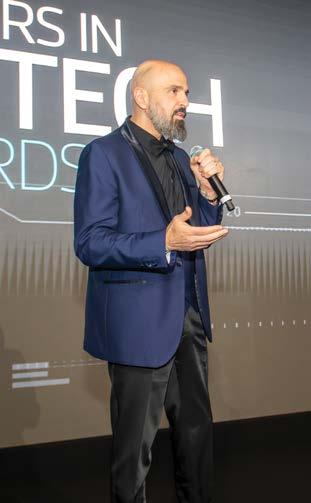
BNC PUBLISHING CEO Wissam Younane
PAYMENT INNOVATION OF THE YEAR AWARD / Comera Pay
BEST USER EXPERIENCE IN FINTECH AWARD / Klaim
DIGITAL PAYMENT PROVIDER OF THE YEAR AWARD / Geidea
CONSULTANT OF THE YEAR AWARD / AJMS Global
BEST B2B FINTECH SOLUTION AWARD / Qashio
DIGITAL MARKETPLACE OF THE YEAR AWARD / Watermelon
PAYMENT SOLUTION OF THE YEAR AWARD / Payermax
FINTECH ENABLEMENT LEADER OF THE YEAR AWARD / Khalifa Fund
MOBILE APP OF THE YEAR AWARD / Botim
CYBERSECURITY EXCELLENCE AWARD AWARD / Cyber 50 Defense
ENTREPRENEUR OF THE YEAR AWARD / Helal Lootah, co-founder of Lune
FINTECH HUB OF THE YEAR AWARD / DMCC
STARTUP OF THE YEAR AWARD / Paylater
FINTECH COMPANY OF THE YEAR AWARD / Dupay

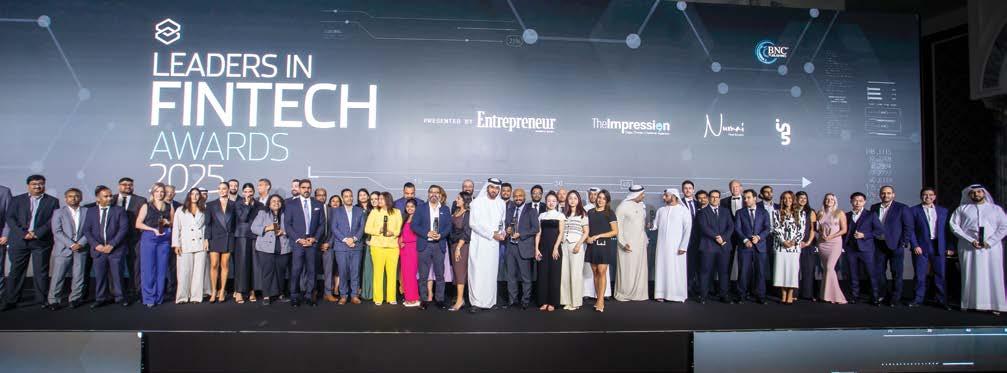

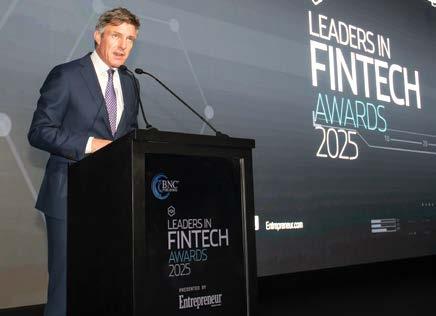
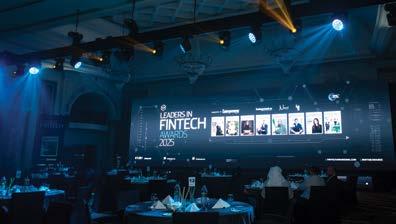
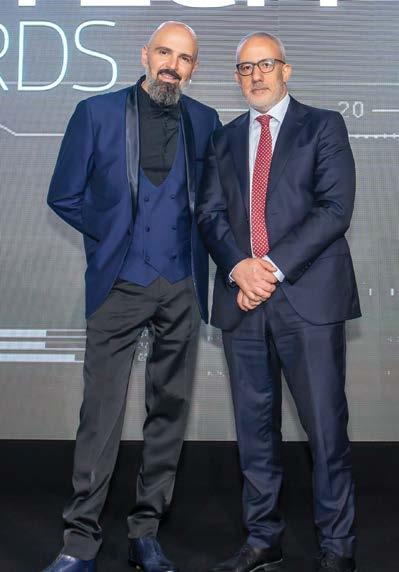
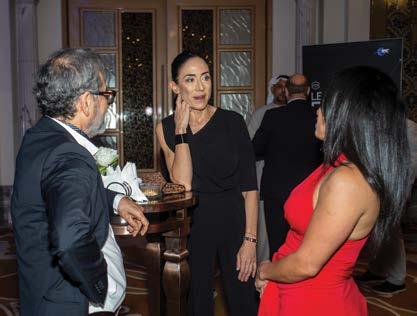
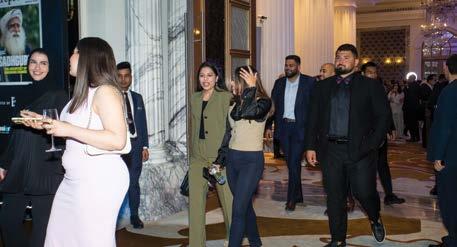
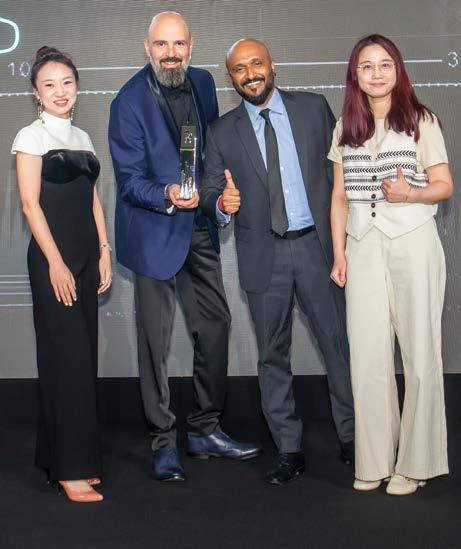
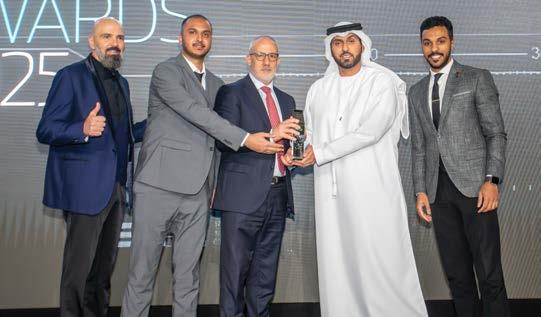
CYBERSECURITY
EXCELLENCE AWARD AWARD - CYBER 50 DEFENSE

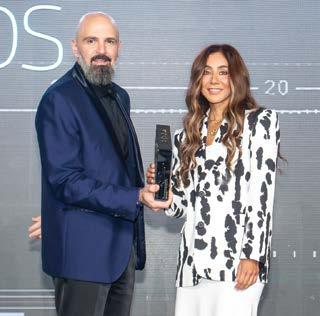
DIGITAL PAYMENT
PROVIDER OF THE YEAR AWARDGEIDEA
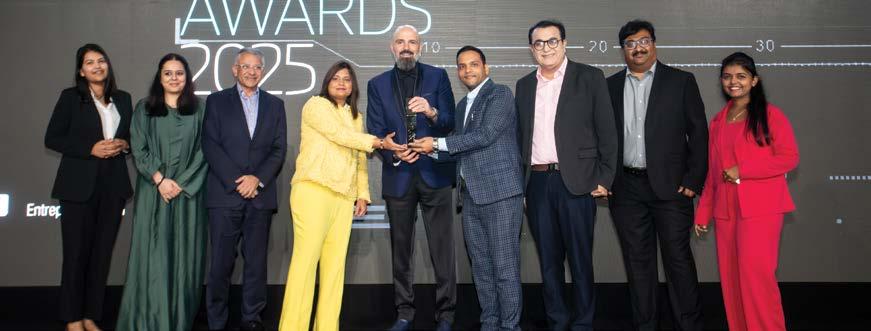
CONSULTANT OF THE YEAR AWARD - AJMS GLOBAL
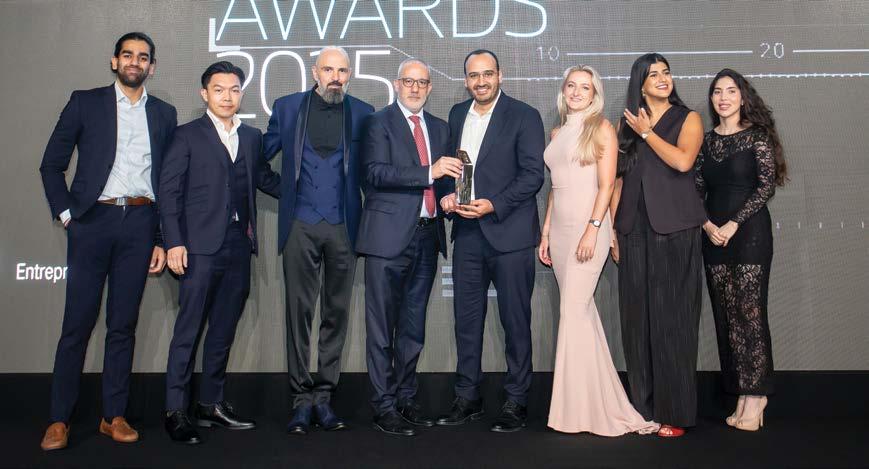

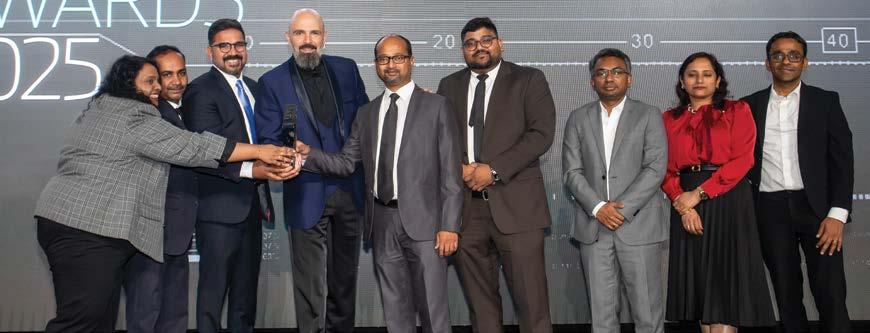
PAYMENT INNOVATION OF THE YEAR AWARD - COMERA PAY
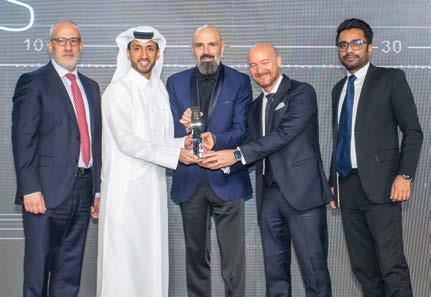
STARTUP OF THE YEAR AWARD - PAYLATER FINTECH ENABLEMENT LEADER OF THE YEAR AWARDKHALIFA FUND

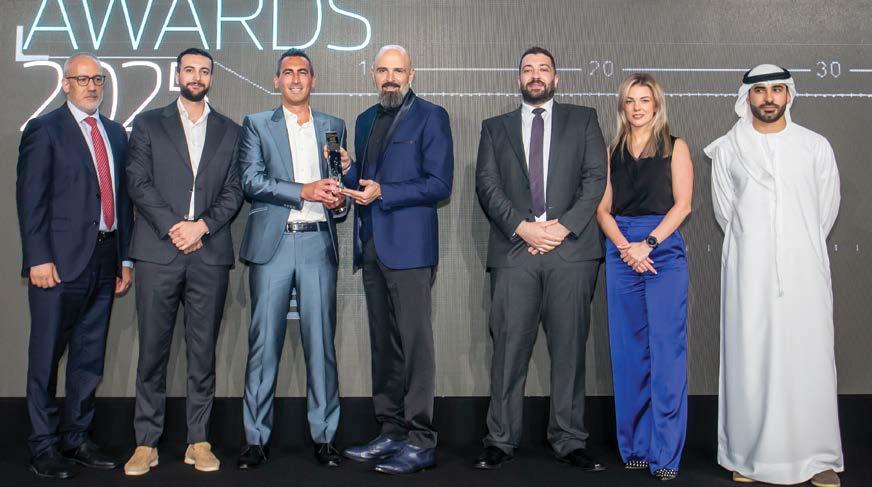
FINTECH HUB OF THE YEAR AWARD - DMCC

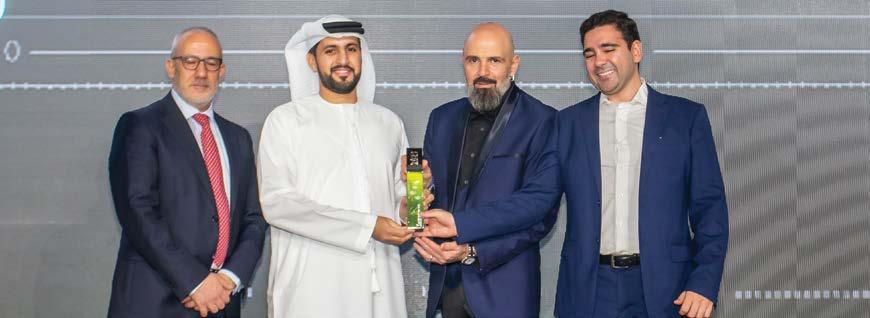
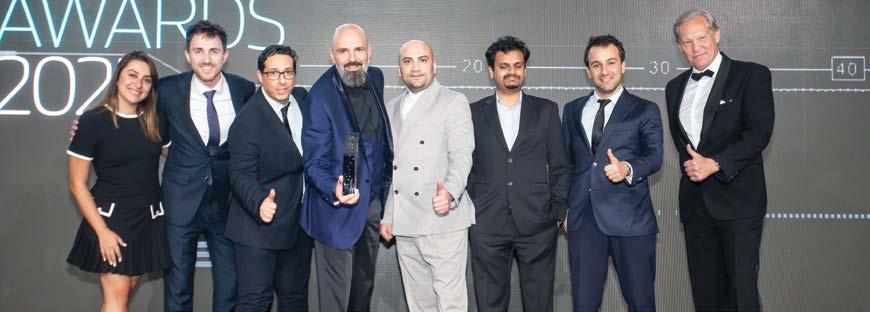
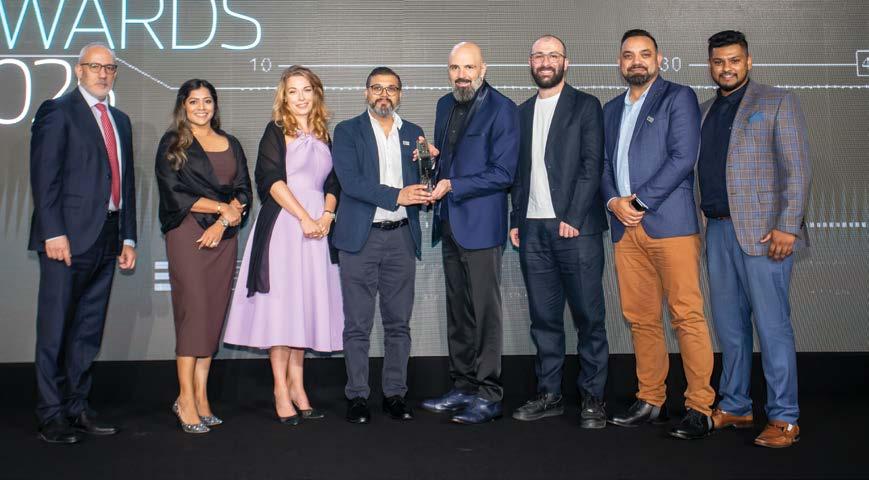

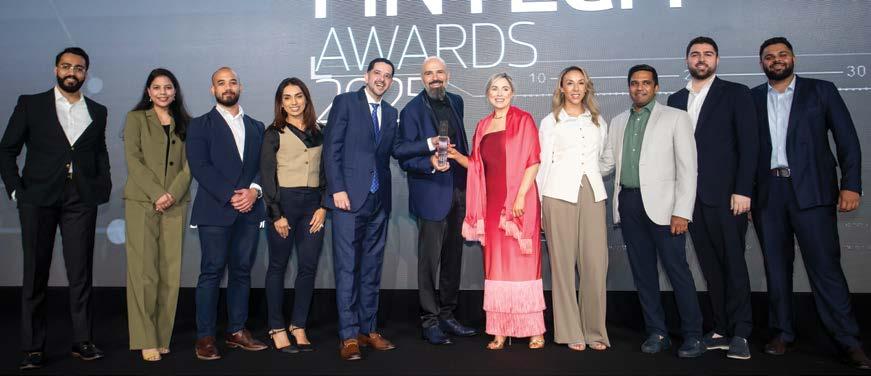

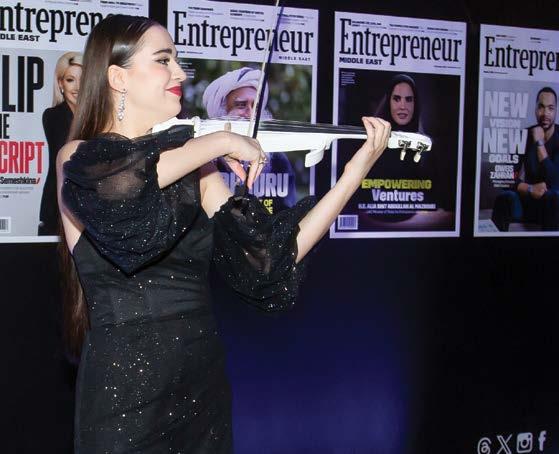
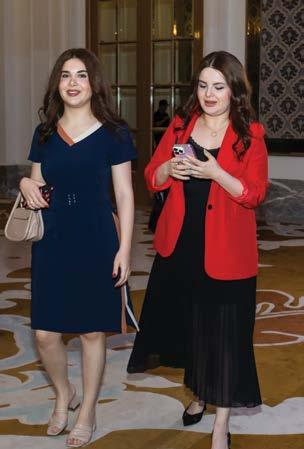

Bringing luxury seaside living to Sharjah for the first time, owners at the Anantara Sharjah Residences enjoy access to the Anantara Sharjah Resort’s world-class amenities, including an infinity pool, five distinctive restaurants, an Anantara Spa and a state-of-the-art gym. As an investment, owners can enjoy the benefits of a rental management scheme operated by Anantara Hotels, Resorts & Spas, allowing them to maximize their returns when they are not resident in the property.
To register your interest, visit arada.com
LIFE IS A JOURNEY.
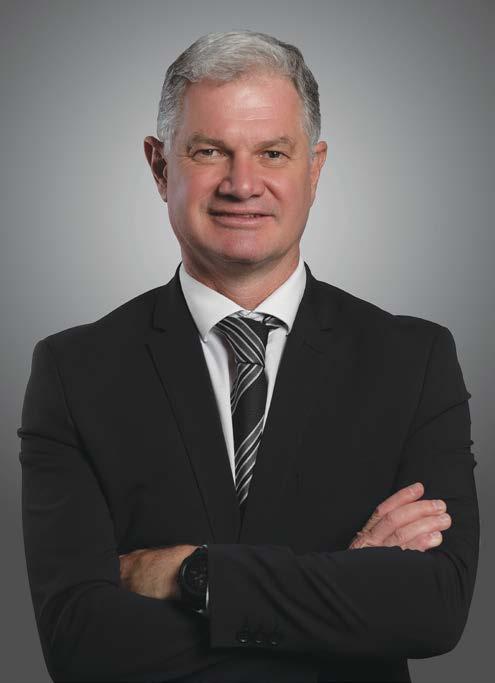
The global automotive industry has unequivocally embraced the demand for electric vehicles in the modern world. But as the Managing Director for the UAE operations of two of the most trusted brands in the world – Toyota and Lexus– Jacques Brent sees the push for vehicle electrification and AI integration as a means to solidify a legacy of trust that has spanned nearly nine decades.
by AALIA MEHREEN AHMED
Legacy is earned, but it also needs to be nurtured and protected every day–for us, that means blending time-tested reliability with future-forward innovation.” If Jacques Brent’s leadership style had to be encapsulated in one quote, it would perhaps be this one. Having taken on the mantle of Managing Director of Toyota and Lexus UAE, Brent has been at the helm of both automotive giants’ regional operations since early 2023. “While protecting an established legacy is crucial, the automotive industry is undergoing massive change, with more expected in the next decade than in the last 30 or 40 years,” he says. “As such, innovation is not contradictory to the brand’s values but it is an evolution. I believe in pushing for innovation while respecting the established culture. My team is challenged to do things differently and challenge the status quo, with my support and guidance. Innovation involves challenges and risks, including resistance to change, where new ideas face skepticism. But learning happens by making mistakes,
and these are often the biggest lessons. I prefer that my team not make the same mistake twice. In a fast-moving environment, the ability to react quickly is important. A leader’s role is removing bureaucracy to make it easier for the operational teams to function. While strategy and ideas are important, I believe this should translate into action on the ground.”
The urgency in Brent’s statements isn’t without reason. A global push for the production of more electric vehicles (EVs) worldwide has meant that automotive brands across the board have had to adapt to this new demand. The International Energy Agency’s “Global EV Outlook 2025” shows that electric car sales topped 17 million worldwide in 2024, rising by more than 25%. In October 2024, American research and advisory firm Gartner forecasted that 85 million EVs will be on the road by the end of 2025, indicating a 33% growth compared to last year. For now, much of this growth is expected to be led by China (58%) and Europe (24%). But that isn’t to say that this shift hasn’t
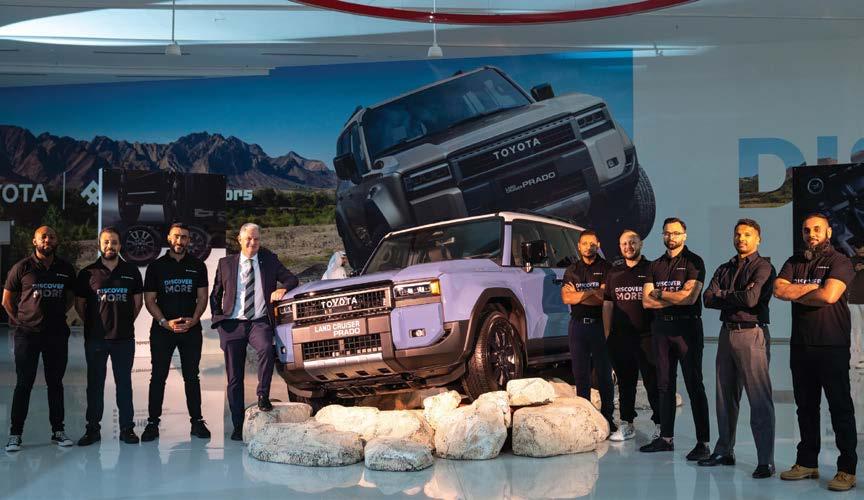
trickled into the Middle East– it has, and Brent’s leadership has ensured that both Toyota and Lexus are at the forefront of driving this change forward. “The UAE’s automotive market is unique in its expectations of both performance and purpose,” Brent notes. “Consumers here value innovation, reliability, and increasingly, sustainability. It’s also a digitally connected population that expects technology-led experiences across every touchpoint: from pre-purchase research to in-car features. At Toyota and Lexus, we are responding by embedding artificial intelligence (AI)-driven features, advanced driver assistance systems, and seamless connectivity into our product strategy. We’re balancing our heritage of reliability with a bold push into electrification, ensuring we stay relevant to evolving expectations. The market is discerning, fast-moving, and purpose-driven. These are qualities we’re matching through smart mobility, hybrid leadership, and localized innovation.”
Serving as a pillar of support in this push for greater electrification, and indeed sustainability, is Al Futtaim Automotive– both brands’ exclusive distributor in the UAE and other GCC countries. “At Al-Futtaim Automotive, we’ve committed to achieving carbon-neutral manufacturing by 2035, and we’re on track to cut emissions across our operations by 50%,” Brent declares. “In the UAE, we’ve introduced a growing portfolio of hybrid and electric models, with plans for further expansion aligned with the country’s Net Zero 2050 vision. We are looking to develop this entire new EV ecosystem in a holistic way, and pioneer new mobility services to support the sustainable transition.”
Brent then reveals that by as early as 2030, Al-Futtaim Automotive has plans to deliver 50% new energy vehicles (NEVs) –vehicles that use non-traditional/non-petroleum
It’s honestly a privilege to lead brands with a significant history and reputation for high quality, durability, and value in the region. Toyota has a deep legacy in the UAE, having been here since the mid-1950s and iconic status, even being synonymous with early development on Sheikh Zayed Road.” “
energy sources and are designed to reduce emissions and reliance on fossil fuels– and install 10% of its charging stations in the UAE. “We are also making our showrooms and service centres more sustainable,” Brent continues. “We are building a comprehensive EV ecosystem from electric vehicles to a truly immersive virtual reality (VR)-based automotive showroom, and cutting-edge electric mobility training technologies for EV technicians. We’re also actively investing in infrastructure, aiming to install 10% of the UAE’s EV charging stations. These steps are about building confidence in greener mobility, paving the way for widespread electrification.”
But in all of this lies an imperative question: are the UAE and wider region’s consumers ready to embrace the EV storm? “The shift towards environmentally conscious
WE ARE BUILDING A COMPREHENSIVE EV ECOSYSTEM FROM ELECTRIC VEHICLES TO A TRULY IMMERSIVE VIRTUAL REALITY (VR)-BASED AUTOMOTIVE SHOWROOM, AND CUTTING-EDGE ELECTRIC MOBILITY TRAINING TECHNOLOGIES FOR EV TECHNICIANS. WE’RE ALSO ACTIVELY INVESTING IN INFRASTRUCTURE, AIMING TO INSTALL 10% OF THE UAE’S EV CHARGING STATIONS.”
purchasing in the UAE has been accelerating,” Brent notes. “We see this especially among millennials and Gen Z, who are increasingly prioritizing sustainability, innovation, and brand values when making high-investment decisions like buying a car. At Toyota and Lexus, we have been tracking this evolution and leading it. Our approach combines advanced data analytics, real-time consumer insights, and a deep commitment to sustainable mobility. From our expanding range of hybrid and electric vehicles to AI-powered in-car experiences that enhance efficiency, every innovation is designed to meet the expectations of a more responsible, tech-savvy customer base, without sacrificing performance or the premium experience both brands are known for.”
Here, however, Brent offers some important transparency in understanding the regional driver’s attitudes. “While the most rewarding part of this journey has certainly been leading the transformation of two legacy brands into future-ready, technology-enabled mobility partners, one challenge has been navigating consumer perceptions around
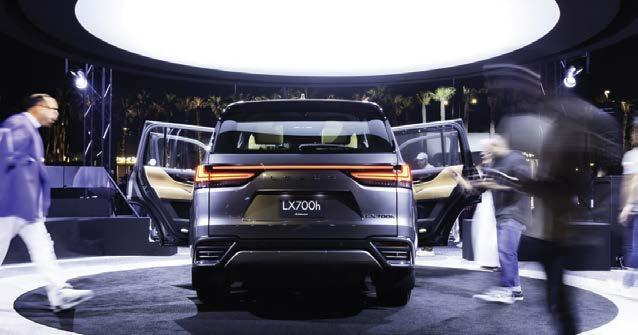
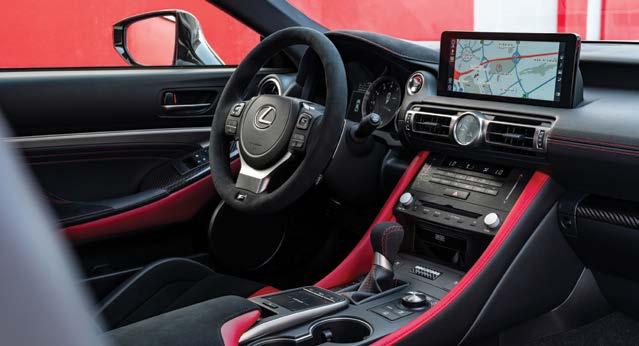
electrification, particularly range anxiety and EV readiness in the UAE’s climate,” he shares. “We addressed this by positioning hybrids as a bridge to EVs, backed by education, test drive initiatives, and localized product engineering. What stands out
is the passion of the team and the willingness of customers to embrace new ideas when they’re backed by trust and value. That trust is something we never take for granted.” Indeed, it is this deeply ingrained brand trust that Brent alludes to when
asked how he manages the responsibilities of not just leading two automotive giants but also injecting new ideas into them. “It’s honestly a privilege to lead brands with a significant history and reputation for high quality, durability, and value in the region,” he
says. “Toyota has a deep legacy in the UAE, having been here since the mid-1950s and iconic status, even being synonymous with early development on Sheikh Zayed Road. Leading such brands comes with a lot of pressure, but the advantage is a well-established customer base. The core attributes of Toyota and Lexus products – their durability, quality, and reliability – are deeply ingrained in customer perception, leading to the belief that if you want a vehicle to do a million kilometers, “it should be a Toyota”. Trust is built through familiarity with the product and belief in what it delivers. My role involves not only managing the product side but also ensuring that the customer service experience matches the quality of the vehicles.”
Brent’s leadership at Toyota and Lexus UAE, however, isn’t his first rodeo in the world of automotives. Prior to his current role, he enjoyed a highly successful 24-year career with Ford, starting at the American automobile manufacturer’s South Africa operation in 1995, which eventually culminated in a role as Global Director, Product Marketing at Ford’s headquarters in Dearborn, Michigan. “My first experience in Asia Pacific came with a move to Ford’s Shanghai office to take on the role of Executive Marking Director for the Asia Pacific and Africa region, following a successful term as Vice President of Marketing,
→ Brent led the unveiling of the Lexus LX700h in Dubai—Lexus’s first electrified LX—positioned as “sustainable luxury.”
Under his leadership, 40% of Lexus sales in the UAE are hybrid models.

“
We’re balancing our heritage of reliability with a bold push into electrification, ensuring we stay relevant to evolving expectations. The market is discerning, fastmoving, and purpose-driven. These are qualities we’re matching through smart mobility, hybrid leadership, and localized innovation.”
Sales and Service for Ford Motor Company of Southern Africa,” he shares. “I served as the President of Ford Middle East and Africa, leading the company’s operations across 70 markets at the newly launched business unit headquartered in Dubai. I was deeply involved in Ford’s transition to electric vehicles, an experience that has stood me in good stead while negotiating Al-Futtaim Automotive’s sustainable mobility strategy. I have worked globally, including
in China, the US, the Middle East, and South Africa. My career journey has involved taking opportunities and capitalizing on them.”
Indeed, it has been this ability to break into new areas of innovation that has defined his tenure at Toyota and Lexus as well. “Our roadmap is clear: accelerating electrification, deepening AI integration, and localizing innovation,” Brent says. “Smart mobility is building intelligent systems that anticipate user
needs, optimize performance, and elevate safety. We’re investing in AI-powered platforms, such as Toyota Safety Sense, and connectivity features that sync with our customers’ digital lives. In parallel, our vehicle lineup is evolving with hybrids, BEVs, and eventually hydrogen-powered models, all tailored for the UAE’s unique climate and infrastructure.”
It is with this sense of purpose that Brent hopes that both brands now become “favoured partners in mobility, sustainability, and smart living.” “Looking to the future, we’re expanding our AI-led product strategy, accelerating electrified powertrains’ rollouts, and deepening customer personalization across every touchpoint,” he says. “Personally, I remain committed to servant leadership: listening to our team, reducing friction in operations, and enabling bold ideas. The next chapter is about transformation; with legacy as our foundation and innovation as our path forward.”
/Big Idea
In the 106 years that Jashanmal Group has been operational, the regional retail industry has seen a rollercoaster of growth and shifts. The secret behind the company standing the test of time lies in two simple values, says Group CEO Shuja Jashanmal.
by AALIA MEHREEN AHMED
Across the multitude of malls and shopping complexes the UAE has to offer, the name “Jashanmal Group” has become a familiar sight for many. But while the company has over 150 stores across the UAE, Kuwait, Bahrain, Oman, and India today, its story begins in 1919 in Basra– a port city in the south of Iraq. “Our 106-year-old legacy is rooted in a simple principle: trust is why we exist,” says Shuja Jashanmal, the Group’s CEO. “From our first store in Basra to today’s omnichannel presence, we’ve consistently brought world-class quality to the region, always at fair prices, never overcharging. That consistency in delivering on our promise is what ‘Jashanmal’ stands for - trust earned through resilience, quality upheld across generations, and values honored through every evolution. We balance heritage and innovation by embedding these principles in a modern retail setting. True longevity comes from honoring our past while boldly shaping the future.”
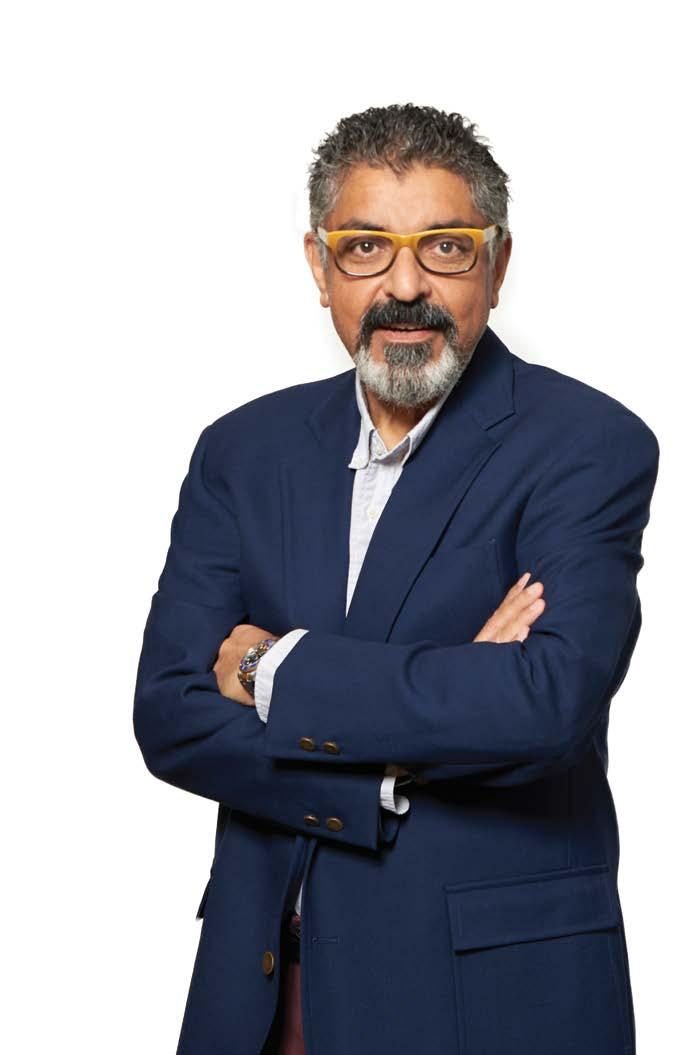
“
The secret to our 106year longevity lies at the intersection of family legacy and forward-thinking values. At its core, we operate on a principle instilled by my late grandfather: “Always keep the family together.”
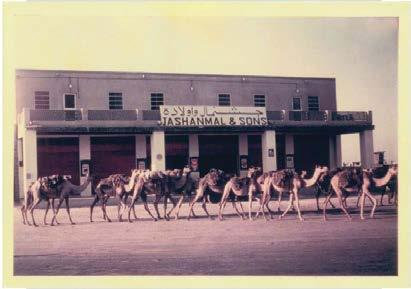
While the retail industry in the UAE and the wider region went through multiple makeovers in the past century, the Jashanmal Group steadily cemented itself as an avenue for affordable luxury. “Our meticulously curated lineup features iconic global brands such as Bally, BOSS, Brooks Brothers, MAX&Co., Reiss and others for the GCC market, emphasizing quality and refined aesthetics,” Shuja explains. “Our strategy focuses on exclusivity and experiential retail. Our stores are designed as showrooms where customers engage deeply with products. Luxury gift cards, featuring elegant packaging and flexibility, further elevate the gifting experience. We aim to make luxury attainable while driving trends like sustainable consumption, leveraging our 20+ years of brand partnerships to cement our leadership in this highgrowth space.”
Here, the CEO explains how measured modifications to the Group’s operations over the years have allowed the company to not just adapt to changes in the ecosystem but often initiate them. “Jashanmal’s core target audience has been Emiratis and Arabs, affluent western and Indian expats,” Shuja says. “While their expectations have evolved with the market, our core demographic remains premium-focused consumers. Today’s shoppers demand convenience, personalization, and bespoke experiences which has driven the launch of our digital gift cards and curated online assortments. Factors like mobile-centricity and cultural traditions (e.g., Ramadan gifting) have had a huge influence on the market environment. We respond with hyper-localized offerings, such as the exclusive Ramadan collection across our fashion brands, retro refrigerators designed for the Emirati majlis, and more — ensuring we resonate across generations and nationalities in the GCC.”
At the heart of Jashanmal Group’s ability to keep up with shifting trends and behaviors is a strategic
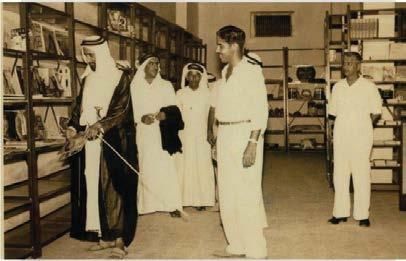
approach towards consumer insights, explains Shuja. “Our leadership team engages directly with market data, franchise partners, and customers to anticipate shifts,” he continues. “For example, by identifying Ramadan gifting trends early, we drove a 50% year-on-year (YoY) uptick in gift card sales. We also align with macro-visionaries like the UAE’s Vision 2030, embedding sustainability and digital growth into our strategy. Staying agile and curious ensures we lead rather than follow.”
A 2024 report by UAE-based investment banking advisory firm Alpen Capital showed that retail sales in
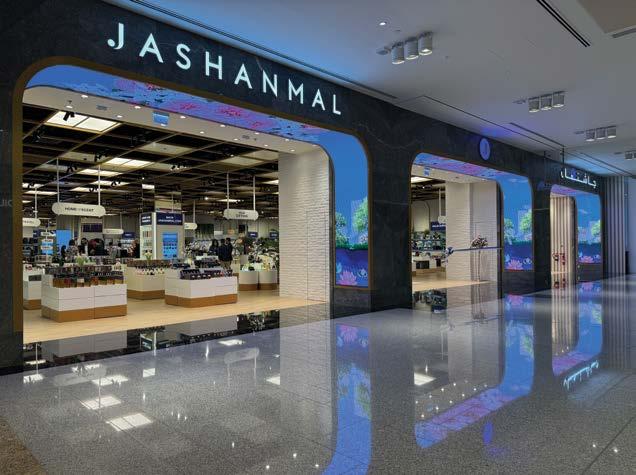
the GCC are projected to grow at a compound annual growth rate of 4.6% to reach a whopping US$386.9 billion in 2028.
“Moreover, the UAE’s retail landscape stands among the world’s most dynamic, characterized by rapid digital adoption, experiential consumer expectations, and sustained growth, with sales projected to reach $139 billion by 2028, according to a report by Yardstick Marketing Management,” Shuja adds. “At Jashanmal Group, we’ve thrived in premium segments, primarily fashion, curated home solutions, premium appliances, beauty, and fragrances, with partnerships with notable brands like MAX&Co. and Reiss, that saw over 20% YoY growth during Ramadan.”
In recent times, perhaps the single most significant shift in the retail industry has been the shift towards e-commerce. Identifying it, and then transforming Jashanmal Group into an
omnichannel business turned out to be a game-changer for the company. “Our success is anchored in recognizing pivotal industry shifts early,” Shuja reiterates.

“The rise of omnichannel retail prompted our strategic launch of Jashanmal.com in 2020, which now drives consistent double-digit annual growth. Meanwhile our physical stores evolved into experiential showrooms. Managing e-commerce for prestigious brands like Bally and Clarks has significantly broadened our market presence and deepened our connection with discerning customers. This synergy between online and offline lets customers “touch and feel” premium products while enjoying seamless digital perks. This makes omnichannel non-negotiable for modern retail.”
“Similarly, the demand for sustainable luxury and hyper-personalization has aligned perfectly with our expansion into digital gift cards, a category that surged by 50% during Ramadan,” Shuja continues. “These trends accelerated our vision to transition from traditional retail to an agile, experience-driven retail leader. By transforming stores into experiential hubs and leveraging cultural moments like Ramadan gifting, we’ve remained proactive in catering to evolving consumer expectations and continued to deepen our regional relevance and pioneer the future of retail.”
While it may seem evident that a close watch on the market and consumer insights has led Jashanmal
“
Our success is anchored in recognizing pivotal industry shifts early. The rise of omnichannel retail prompted our strategic launch of Jashanmal.com in 2020, which now drives consistent double-digit annual growth. Meanwhile our physical stores evolved into experiential showrooms.”
Group to persist and thrive amid the changes that have defined the industry it operates in, Shuja himself credits the Group’s success to two simple factors. “The secret to our 106-year longevity lies at the intersection of family legacy and forward-thinking values,” he says. “At its core, we operate on a principle instilled by my late grandfather: “Always keep the family together.” This unity, maintained through generations despite evolving perspectives, creates the stability that fuels every facet of our business. It fuels our

dual commitment to long-term relationships and service excellence, where every action prioritizes enduring impact over short-term gains. This manifests as a culture where succession is earned, not inherited, necessitating leaders to prove their worth. We honor tradition while empowering new generations to innovate. Values such as integrity and adaptability are ingrained in our corporate culture, empowering us to navigate evolving market landscapes, from entering e-commerce to launching our gift card initiative. Family unity, merit-driven evolution, and commitment to excellence will drive our pursuit to remain the retail pioneers in the GCC region for centuries to come.”
It is because of these values that Shuja explains his aspirations for the future in terms of a timeline that will most certainly extend beyond his tenure as Group CEO. “At Jashanmal, we believe that leader-
ship is merit-based– this mindset has taught me to value agility over hierarchy, customer insights over assumptions, and to empower fresh perspectives,” he says. “It is our succession philosophy: the next generation will lead by demonstrating value, ensuring Jashanmal progress without compromising the core values that define us.”
For the moment, however, Shuja is happy to take on the role of helming the Group’s future goals.
“Looking forward, we’ll strengthen our core retail and distribution while expanding strategic partnerships, bringing iconic luxury brands to the GCC,” he declares. “Digital innovation and experiential retail will continue to accelerate. Sustainability will be integral across the value chain, aligning with the spirit of UAE Vision 2030. Ultimately, we’re building on our legacy to define the future of modern retail, balancing heritage with relentless pursuit of progress!”


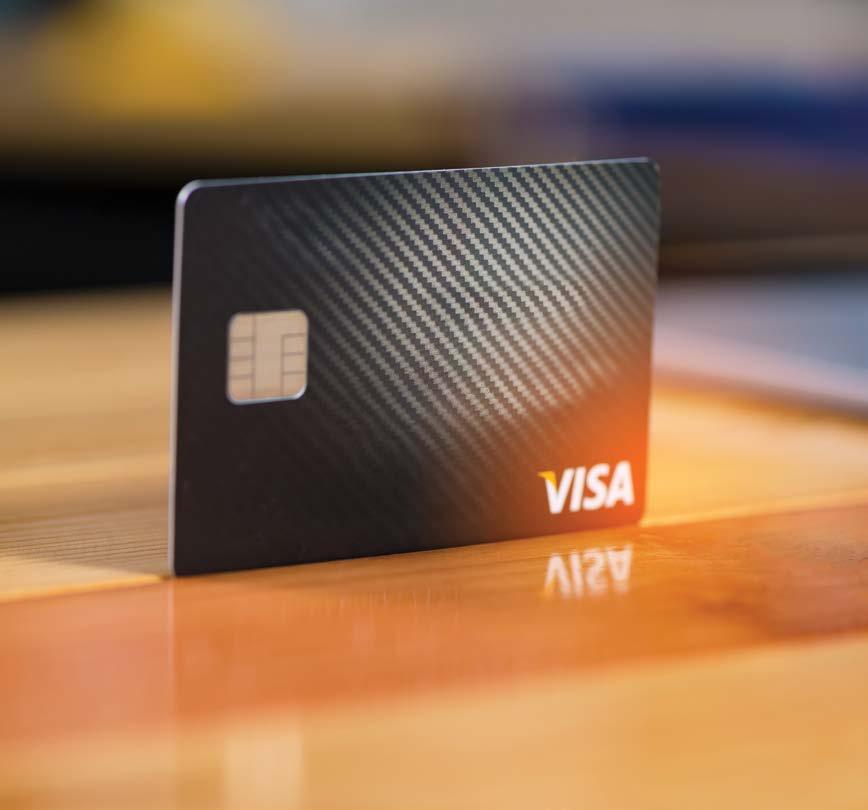
Visa, the global digital payments platform, has revealed its “Checkout Friction Report”, a new study which dissects factors that consumers demand for a more secure and seamless e-commerce experience.
The research is based on a survey of 2,016
Speaking exclusively to Entrepreneur Middle East, Dr. Saeeda Jaffar, Senior Vice President and Group Country Manager - GCC at Visa, notes that difficult or time-consuming checkout processes continue to be a leading reason for cart abandonment. “Across the GCC, 43% of respondents cited concerns around payment security, while 38% pointed to the inconvenience of manually entering card details,” she says. “These are often decisive moments in the online shopping journey. If the process feels clunky or untrustworthy, it increases the likelihood that a customer will leave before completing their purchase.
Specificially with regards to the UAE, the report shows that one in three respondents (33%) in the country shops multiple times a week for groceries. For categories such as fashion, entertainment, and electronics, shopping frequency ranges from once to a few times a month.
According to 40% of respondents, the biggest frustrations with online checkouts are security concerns, followed by the hassle of entering card details manually (37%). Indeed, 58% of the surveyed consumers say they’re worried about the risk of fraud or hacking when storing their card details on multiple websites, with the report also showing that 42% of respondents have experienced fraud or security breaches.
By addressing these challenges, retailers can enhance the checkout experience which could lead to increased customer satisfaction- a demand that, as per the “Checkout Friction Report,” is continually surging. “Almost 80% of respondents said they would be more likely to
online shoppers across the GCC, including the UAE, and explores their experiences with e-commerce purchases. It examines common pain points during the checkout process that affect both consumer satisfaction and business outcomes.
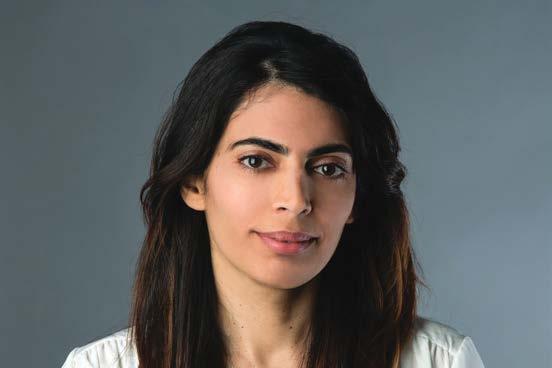
complete their purchases with a one-click checkout option,” Dr. Jaffar explains. “To address this, merchants can explore streamlined checkout methods that reduce friction and meet rising expectations around convenience and security. Whether through faster authentication, fewer form fields, or one-click options, improving this final step can help reduce abandonment and improve overall customer satisfaction.”
Reflecting this sentiment is a key finding in Visa’s “Checkout Friction Report”, which reveals a strong preference for a more streamlined checkout: 65% of respondents support a single registration process for online payments across all participating merchants.
But all of this brings forth an inevitable question: have there been any statistics within the report to suggest that users abandon checkout at the payment entry stage compared to other stages of purchasing? Dr.
Jaffar replies that while the report does not break down abandonment by specific stages, the data points towards one concrete conclusion: the payment stage is where many consumers encounter the most friction.
“Consider this scenario: you are ordering a last-minute birthday gift on your phone during a busy day; you find the right item, add it to your cart, and proceed to checkout, but just as you are ready to pay, you are prompted to manually enter your card details and asked whether you want to save them for future purchases,” Dr. Jaffar explains. “You pause — not because you changed your mind about the gift, but because you are not comfortable storing your card information on an unfamiliar website. This hesitation is common. Nearly 6 in 10 consumers across GCC said they are concerned about the risk of fraud or hacking when storing card details across multiple sites. That moment of doubt, especially when combined with time
pressure or a poor mobile experience, is often where a purchase is lost.”
The solution, Dr. Jaffar reiterates, lies in creating trust at the checkout stage.
“When customers feel confident their payment details are protected, they are more likely to complete the purchase and return again, Jaffar notes. “In today’s digital landscape, a seamless checkout is not just a convenience — it is a driver of business performance.”
One particular option that has emerged as a winning solution in this regard is that of biometric authentication- two-thirds (67%) of Visa’s respondents said they would use it to check out, with many trusting biometric authentication (fingerprint/ face ID) more than traditional payment methods (passwords/OTP).
As such, catering to the consumer base’s growing affinity towards this option is Visa’s Click to Pay- a service that streamlines online shopping by providing advanced checkout experiences, eliminating the need to manually enter card details, thereby making transactions significantly faster. At participating e-commerce platforms, consumers can simply click the Click to Pay button to complete their purchase quickly and easily using their preferred Visa card and shipping address.
For businesses, the demand for simpler and safer checkout options is clear. Most respondents (82%) would shop online more frequently and be more likely to complete their purchases with a one-click checkout option. Two-thirds of the surveyed consumers (66%) show a high likelihood of using Click to Pay with Biometrics if offered by online retailers.
“Challenges in the online checkout process have direct implications for businesses, resulting in lost revenue, and hampering both customer acquisition and retention,” said Salima Gutieva, Visa’s VP and Country Manager for UAE, added in a separate statement. “Today’s consumers expect – and deserve – a more seamless and secure e-commerce experience. That’s why Visa is working with partners to
NEARLY 6 IN 10 CONSUMERS ACROSS GCC SAID THEY ARE CONCERNED ABOUT THE RISK OF FRAUD OR HACKING WHEN STORING CARD DETAILS ACROSS MULTIPLE SITES. THAT MOMENT OF DOUBT, ESPECIALLY WHEN COMBINED WITH TIME PRESSURE OR A POOR MOBILE EXPERIENCE, IS OFTEN WHERE A PURCHASE IS LOST.”
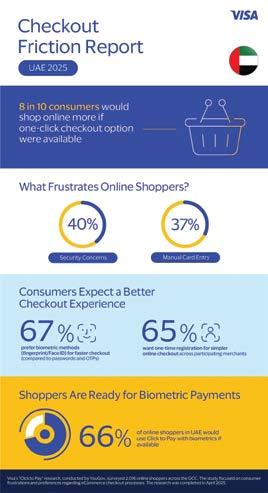
enable solutions like Click to Pay, which leverages biometrics and tokenization to eliminate key pain points and deliver a more convenient shopping experience. Improving these moments not only drives business results but also builds on the UAE government’s achievements in building a seamless, secure digital economy.”
Now, while Visa’s Click to Pay relies on biometric authentication available on the consumer’s device and does not require transfer of biometric data, there still exist general concerns surrounding the use of such sensitivemore specifically, how and where they are stored. “These concerns are valid and increasingly important as biometric authentication becomes more common in digital payments,” Jaffar says. “How this data is handled plays a crucial role in building and maintaining consumer trust. That’s why Click to Pay is designed with security in mind. It uses biometric authentication through Visa Payment Passkey, allowing consumers to approve payments just as they unlock their phone — with a fingerprint or face identification. Importantly, this biometric data stays on the user’s device and is not shared with merchants or payment networks. Keeping it local significantly reduces the risk of misuse or interception.Tokenization adds another layer of protection by replacing card details with a unique, encrypted token. This allows transactions to be processed securely without exposing actual card information. Merchants also play a key role in safeguarding data. Adopting standards such as the Payment Card Industry Data Security Standard (PCI DSS) helps ensure secure storage, encryption, and access control within their systems.
“Protecting sensitive information ultimately requires a layered approach — combining secure technology, compliance with established standards, and a strong culture of data responsibility across the payments ecosystem,” Jaffar concludes.
by BEVERLEY D’CRUZ
In today’s business landscape, sustainability has evolved from a corporate buzzword into a fundamental expectation. Across the Middle East, where economic growth and urban development are accelerating, businesses are re-evaluating how they operate — not only to remain competitive, but to be responsible stewards of the environment.

The food and beverage (F&B) sector is particularly well-positioned to lead this change. With high energy demands, supply chain complexities, and significant packaging and food waste, the industry carries both a large environmental footprint and a powerful opportunity for impact.
Drawing from experiences within one of the world’s largest quick-service restaurant brands, this article explores how sustainability practices can be integrated into core business operations in a region as diverse and complex as the Middle East. The focus is not on promotion, but on practical strategies and challenges — and how companies can begin or deepen their journey toward environmental responsibility.
While global sustainability frameworks offer a helpful foundation, regional adaptation is essential. In the Middle East, climate, infrastructure, and policy differ widely between countries — from water scarcity in the Gulf to rapidly urbanising centres
in the Levant. Businesses must tailor their strategies to reflect these realities. For example, energy use is a key area of focus, especially in hot climates where cooling systems are essential. Understanding and optimising HVAC (heating, ventilation, and air conditioning) systems is not just a technical detail — it’s a business imperative. Similarly, innovations like low proximity hoods in kitchens can reduce overall energy consumption significantly when implemented at scale. Investments in energy-efficient equipment, such as LED lighting and high-efficiency refrigeration, might seem minor in isolation. Yet, when adopted consistently across locations, they contribute meaningfully to both environmental impact and operational cost savings.
Three Core Pillars of Sustainable Practice
Sustainability efforts in the F&B industry often centre around three main pillars: environmental responsibility, responsible sourcing, and waste reduction. Each presents its own challenges and opportunities in the Middle Eastern context.
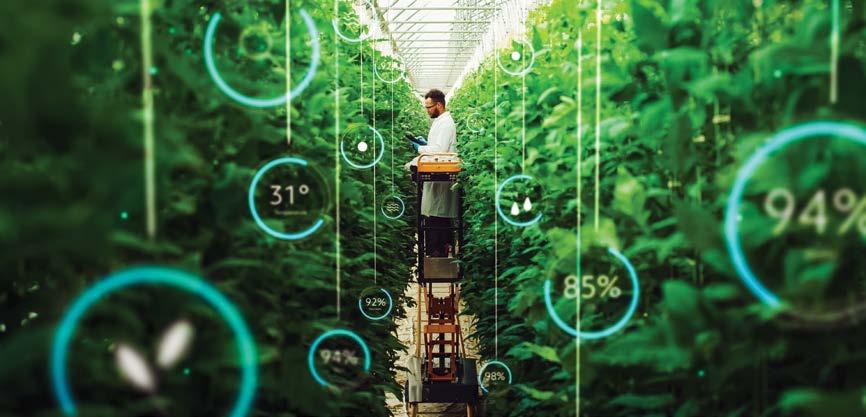
1. Environmental Responsibility
Adopting energy-saving technologies, exploring renewable energy sources like solar (particularly in high-insolation regions such as the UAE and Saudi Arabia), and conserving water through low-flow fixtures and efficient cleaning practices are becoming standard in many progressive operations.
2. Responsible Sourcing
Local procurement reduces emissions tied to transport while supporting regional economies. Businesses are increasingly working with suppliers who meet standards not only for quality, but also for ethical labour practices and environmental impact. Rigorous auditing and supply chain transparency play a key role in maintaining accountability.
The F&B sector produces large volumes of waste — food scraps, packaging, and single-use materials among them. Inventory control systems, food donation programs, and in-store recycling can help mitigate
this. In some regions, composting is also gaining traction, despite infrastructure challenges.
Implementing sustainability measures in the Middle East comes with complexities. Regulatory environments vary, and upfront costs for green technologies can be a barrier. Infrastructure for recycling and renewable energy may be inconsistent across markets. Yet, these challenges also open the door for innovation. Businesses willing to invest in energy solutions or engage with local suppliers to build capacity often find long-term gains — both financially and reputationally. Moreover, as consumer awareness around sustainability increases, demand is growing for businesses that can demonstrate real action, not just intention.
Sustainability is not a destination but a continuous process. As governments across the region introduce more robust environmental policies and incentives,
there is growing momentum for businesses to step up. The future of sustainable business in the Middle East lies in partnership — with suppliers, regulators, and communities alike. For the F&B industry in particular, every decision — from equipment to packaging, sourcing to staff training — holds the potential to shape a more resilient, responsible business model. The companies that succeed will be those that not only adapt to change but help lead it.

Beverley D’Cruz is the General Manager of Pizza Hut Middle East & Pakistan, where she leads the brand’s growth strategy and operations across more than 550 outlets in the region, including 160 in the UAE. With over 18 years of experience at Yum! Brands, Beverley has held key leadership roles within both Pizza Hut and KFC across Canada, the UK, and the Middle East. Most recently, she served as Chief Brand Officer for Pizza Hut META, driving impactful initiatives to elevate the brand.
/Management

by SHERIF FODA
There’s a CEO I met once—let’s just say the name was well known. What shocked me wasn’t the private jet or the outrageous spending perks. It was the number: $140 million. That was his annual pay package—in a year when the company lost money, its share price tumbled, and its market cap was less than $300M. Let that sink in.
We live in a time when the average worker is being told to tighten their belt, accept layoffs, or “pivot” their skills. Meanwhile, the same executives who preside over declining revenue, shrinking market share, and mass firings, are cashing in 8-figure checks without a hint of shame or any accountability.
When I was younger, my grandfather would tell me: “If a man makes more than 100 times what the average employee makes, he’s not a good leader.”
Today, CEOs are pulling in not 100 times, but sometimes 10,000 times the median employee pay. Yes, we have ESG reporting, Environmental, Social and Governance, where companies are required to disclose the CEO-to-median pay ratio. But disclosure without accountability is performative. The ratios are exposed—and ignored. The defenders of this system will say: “But the CEO creates value for shareholders!”
I say, absolutely, but show me the KPIs. Show me the shareholder return. It should be proportional and we should never have a golden parachute for failure. If a CEO can walk away richer while the company lays off thousands and loses money and value—what exactly are we rewarding?
If you believe in risk and reward, and I do, then you should believe in earned rewards, not unearned windfalls.
When I started the company, I made a simple rule: I’ll take zero stock for myself, or what is called issued shares for executives, unless I create a value to everyone: employees and shareholders. And since inception for the past seven years, I haven’t taken a single share from the company. My
bonus is also linked to the performance of the firm, so when we had troubled years, I ensured I declared in public: zero bonus and zero shares for myself as the CEO, which is the opposite to what happens in the market.
Additionally, I ensure to distribute all these shares
compensated for the value they bring. I simply link it to the performance of the firm. If the company makes money, everyone does too!
I recall I gathered the top 40 managers of the company one year and told them they will all be millionaires as we will

to the employees of the firm. Why? So they feel empowered, own part of the company, and believe they are equally
issue them shares that they can cash in as the company grows and they will surely pass the $1M$ mark. And guess what?
That is exactly what happened, and why? Because I was able to give them that percentage from the stock pool that is usually kept for the CEO of a company. Sometimes the CEO takes a staggering 1/3 of that pool!
Some people said what I did was silly, and that it would look like the board doesn’t value the CEO. They said no one would care. And maybe they’re right—externally, no one cared. But internally?
Employees got rewarded, and that’s what matters.
Let’s stop pretending that a $50 million bonus is what it takes to keep talent. If your CEO’s only motivation to stay is money, you’ve got the wrong person in the job. Leadership is about accountability. Ownership. Vision. Not just cashing in stock options and delivering jargon-laced earnings calls. And don’t get me started on the idea that these compensation packages are about “retention.” What are we retaining? Someone who might otherwise go start a business? Great. Let them.
We need a hard cap—or at
the very least, hard KPIs—on CEO compensation. Not some cooked metric that gets “massaged” into compliance. I’m talking real performance thresholds tied to real shareholder and employee value; something different so they can get highly compensated when everyone, and the company, does very well. Make executives rich off performance, not presence. If they hit the numbers, let them win big. If they don’t, they walk away like everyone else—with nothing. Because right now, the richest people in the world aren’t inventors. They’re not founders. They’re not even owners. They have obscenely negotiated contracts. And the rest are paying the bill. This isn’t about being anti-capitalist. It’s about capitalism with consequences. If you want to be paid like a genius, you better perform like one. And if the company crashes under your leadership, or even if the market condition is bad, you are a part of it too. We need to stop rewarding failure, start aligning incentives, and bring ethics back into executive pay. Otherwise, the only thing we’re scaling is inequality—and the only thing we’re disrupting is trust.

Sherif Foda is the CEO and Chairman of Nasdaq-listed oilfield services company NESR.
by BEN CORRIGAN
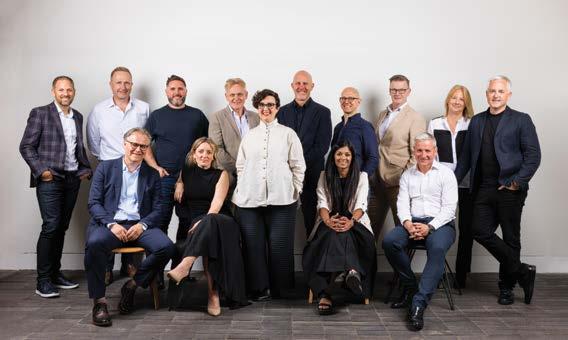
When I founded Bluehaus in a small office on Dubai’s Bank Street in 2002, I didn’t have an exit strategy or a blueprint for acquisition. I simply wanted to build a business that mattered. One that delivered great work, nurtured great people, and stayed relentlessly committed to service.
Twenty-two years later, that journey led to Bluehaus becoming part of tp bennett—one of the UK’s most established architecture and design firms. But this wasn’t a transaction driven by spreadsheets and synergies. It was the next step in a relationship built on mutual respect, shared values, and 15-plus years of collaboration.
} A long engagement: We’ve worked with tp bennett for over 15 years. Together, we’ve delivered projects across the region—from commercial
came together not out of necessity but from a belief in what we could achieve together.
Culturally, we’re aligned. We care deeply about quality, about people, and about how design can shape better outcomes. That’s what made this a natural fit.
} Why now? As a founder, you’re always thinking ahead. What’s the next chapter? How do you protect your people and give them room to grow? For me, this wasn’t about selling a business. It was about evolving it. With tp bennett’s legacy in architecture and design, and Bluehaus’ local expertise across the Middle East, we’re now uniquely positioned to deliver projects that are both globally
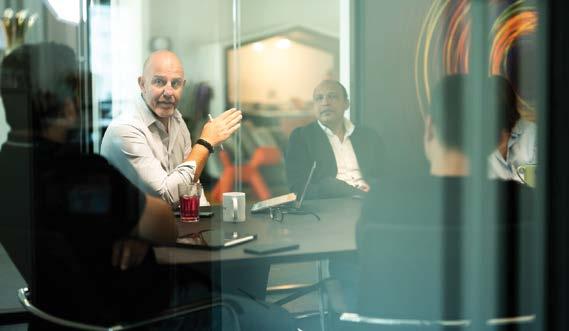
workplaces to large-scale developments. This wasn’t a deal struck over a few conversations—it was a long engagement, shaped by real projects and stress tested over time. And like all meaningful partnerships, it
informed and locally grounded. This partnership brings together a multidisciplinary approach— architecture, interiors, masterplanning, and engineering—under one roof, allowing us to take on increasingly
complex briefs across sectors including workplace, hospitality, retail, healthcare, and education.
We’re proud of what we’ve built with clients like Emirates NBD, PIF, Accenture, Amazon, and Jumeirah— and now, with the backing of tp bennett, we can bring even greater impact to every brief, , both regionally and globally.
} People ffirst, always: As founders, we often talk about growth, margin, and market share. But the real responsibility is to your people. What’s the next chapter for them? How do you protect their growth, their energy, their future?
For me, the move to tp bennett is as much about opportunity for our team as it is about the business. It’s about giving them access to global projects, a broader platform, and the chance to evolve with a world-class team.
At Bluehaus, we’ve never seen culture as a side project—it’s core to how we operate. Over the years, I’ve invested heavily in leadership development, not just for myself, but for our senior team. We’ve brought in business coaches and worked with external partners like 2b Limitless to develop leadership skills with structure and intent.
We’ve also rolled out the Gallup StrengthsFinder across the business, helping every team member, starting with leadership, identify their strengths and lead with them. This investment in our people has shaped how we work, how we grow, and how we show up for one another.
Because when your team thrives, your business does too.
} Brand is behaviour: If there’s one thing I’ve learned, it’s this: your brand is not your logo. Your brand is your behaviour. Every meeting, every presentation, and every email adds up to how people experience your company.
We’ve always focused on delivering great service, constantly improving, and staying curious. That’s what builds brand value. And even if you’re not
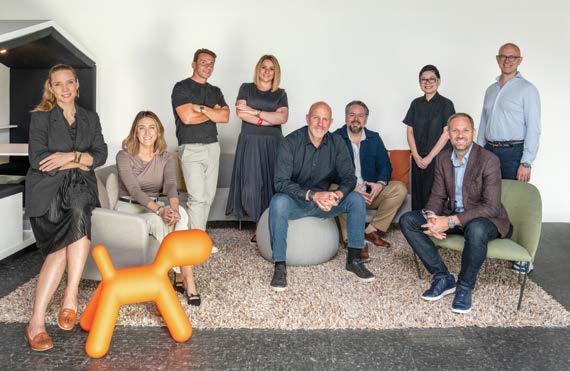
planning to sell, that mindset is invaluable. It forces you to think in terms of substance, not just style.
} Advice to other founders: Many entrepreneurs in this region reach a similar point: a strong, independent business with a loyal client base and a capable team. And then comes the question—what’s next?
My advice is: start preparing long before you think you need to.
} Build with value in mind, not just financial, but cultural and operational.
} Invest in your team and your leadership.
} Get your house in order— financially, structurally, and culturally.
} Stay focused on what matters: service, people, and reputation.
Whether your next step is growth, succession, or a strategic partnership, you’ll be glad you built something resilient.
} A new chapter
My role has shifted from Managing Director to Principal, and I now sit on the board of tp bennett. But my focus hasn’t changed. I’m still doing what I love—leading teams, shaping projects,
and building something meaningful. This partnership is not an end, it’s a new beginning. One that brings new energy, new opportunities, and a shared commitment to pushing boundaries.
And most importantly, it reminds me that success isn’t defined by the deal. It’s defined by the journey and the people you bring along with you.

Ben Corrigan joins tp bennett’s board as a Principal Director. tp bennett is a leading architecture and design practice located in London, Manchester and Leeds with affiliate offices in more than 20 countries. The partnership is supported by specialists in sustainability, strategy, design technology, town planning, research and graphics.
Over 360 staff work across the practice with projects covering a range of sectors including corporate offices, datacentres, education, health, hotels, bars & restaurants, public/civic use, residential, retail & leisure, student residential, and transportation. tp bennett recently completed the award-winning 11 & 12 Wellington Place in Leeds – one of the UK’s most sustainable office buildings
by SALIL KUMAR MALIK
When I first expanded into the GCC market in 2017, I was struck by Dubai’s remarkable ability to blend innovation with aspiration. This city doesn’t just follow global trends — it redefines them. Whether in luxury fashion, hospitality, or retail, the appetite for exceptional, world-class experiences is insatiable. But as I immersed myself more deeply into the regional market, I noticed an unexpected gap: while adults had access to a variety of luxury experiences, children’s spaces were often overlooked.
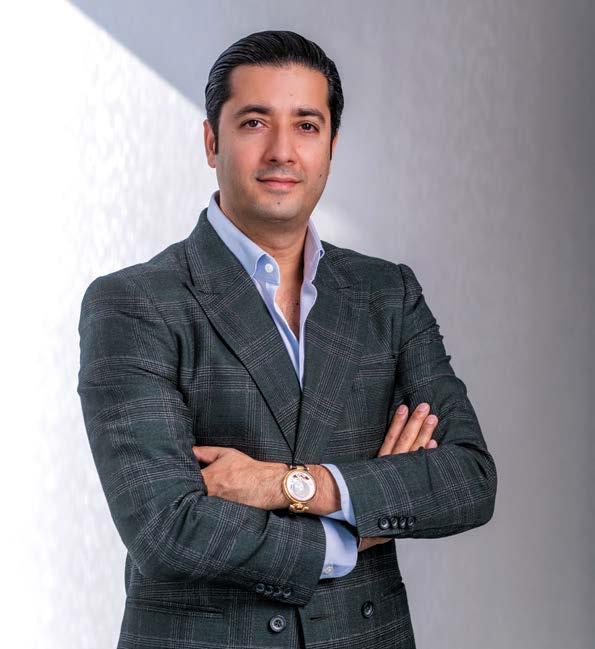
There were, of course, plenty of play zones across malls and entertainment venues — each offering its own version of fun and excitement. But as I observed these spaces more closely, I started to wonder if there was an opportunity to reimagine what a play environment could offer. Could we design something that felt more intentional — a space that supported both imaginative play for children and a sense of ease and connection for parents? That question sparked the journey toward creating an experience that blended creativity, comfort, and care in a way that reflected the values of today’s families.
→ Salil Kumar Malik, Managing Director, Boo Boo Laand
That simple question became the foundation for Boo Boo Laand — a luxury children’s entertainment concept that took two years of research and planning before finally opening at Dubai Mall in October 2024. What we launched wasn’t just a play area; it was a curated world of imagination, where design, education, safety, and customer experience work in harmony. We envisioned a space that children would be excited to explore — and that parents would feel good about. Today, just over six months later, we welcome around 1,800 customers a day — a number that validates not only the concept but the growing demand for premium, family-first experiences.
Building a luxury concept from the ground up requires more than vision. It demands a layered investment of resources, strategy, and heart. So, what does it really take?
Long before any drawings were made or layouts proposed, the journey started with research. I dove into global trends in early
childhood development, sensory play, and emotional wellness. I studied how colors and textures influence mood, how children navigate spaces, and what kinds of interactions hold their attention. Most importantly, I spoke to parents — not in passing, but in depth — about what they wished existed for their families.
The conclusion was clear: families weren’t looking for more noise or overstimulation. They wanted calm. They wanted purpose. They wanted experiences that nurtured their children’s curiosity and imagination without overwhelming them.
One of the most important things I learned was that you’re never designing solely for children. You’re designing for parents too. Children might run toward play structures — but it’s the parents who decide whether to return. Every element of the space needed to resonate with both: to excite the child, while reassuring the adult.
That meant carefully balancing energy and serenity. From the color palette to lighting and layout, we aimed to create an environment that inspired creativity, without causing chaos. Designing in this way became a matter of creating moments of shared joy — experiences that brought families together, rather than separating adults and children into different zones of engagement.
}
Coming from a background in fashion and customer experience, I approached the concept not as a traditional play space, but more like a boutique hospitality offering. That meant putting operational discipline front and center. Everything — from staff training and cleanliness to guest flow and programming — needed to reflect a premium standard.
Customer service, in this context, wasn’t limited to transactions. It was about building trust with parents,
Behind any successful concept is a team that understands the mission. And in a space designed for children, the human element is even more critical. We invested in a team that wasn’t just trained in logistics or safety, but in empathy and emotional intelligence.
creating emotional safety for children, and ensuring that every visit felt intentional and cared for. We weren’t just welcoming guests — we were welcoming families into a space that needed to feel like an extension of their own values.
Dubai is a city that embraces big ideas. But innovation for its own sake can quickly become superficial. Instead, we focused on purposeful innovation — elements that added value to the child’s experience, not just to the marketing narrative.
That meant incorporating multi-sensory elements, tactile environments, and spaces that inspired imaginative play. It also meant drawing inspiration from nature and real-life experiences that children could see, touch, and understand. The goal wasn’t to entertain passively, but to engage meaningfully. We weren’t building distractions — we were building opportunities for learning, connection, and wonder.
}Building
Behind any successful concept is a team that understands the mission. And in a space designed for children, the human element is even more critical. We invested in a team that wasn’t just trained in logistics or safety, but in empathy and emotional intelligence. Every team member needed to understand that they were playing a role in shaping a child’s memory — and a parent’s trust.
Great design can create beautiful spaces. But great people create lasting experiences.
} Emotional Connection as a Metric Six months after opening, the measure
of success I return to most isn’t daily footfall or revenue — though both are important. It’s the look on a child’s face when they don’t want to leave. It’s the parent who tells us that they finally found a space where they could relax while their child played independently. It’s the families who return week after week, because they feel seen, understood, and valued.
In a world where everything moves fast, emotional connection is the most powerful form of currency — and the hardest to earn. But once you have it, it becomes the foundation for community, loyalty, and long-term growth.
} A Note to Fellow Entrepreneurs
For any entrepreneur looking to build something meaningful in Dubai — especially something that serves families — my advice is simple: listen deeply before you build. Don’t be tempted by spectacle or size. Instead, focus on purpose. Let empathy guide your design, let hospitality guide your operations, and let emotional connection guide your strategy. This city rewards original thinking, but only when it’s backed by intention, insight, and care. There’s always room in the market for ideas that meet real emotional needs.
Ultimately, the luxury of childhood isn’t found in themed rides or oversized screens. It’s found in the quiet moments — in time, in attention, in wonder. If we can protect that through the spaces we create, then we’re not just building businesses. We’re building something that truly matters.
Salil
Kumar Malik, is the Managing Director of Boo Boo Laand.


Gadgets and doodads that you might’ve missed out on, sourced by a tech aficionado. by
The Creator Series is a range of tools designed to help content creators easily manage and store media files. Whether you create using a smartphone (like me) or camera, there’s a solution to capture, transfer, edit and back up your work. The Creator Phone SSD for iPhone 15 and above does not disappoint. Designed for producing content on-the-go, it connects to the phone via a short USB Type-C cable. Perhaps the most impressive aspect of its workflow is that the drive is MagSafe compatible and attaches to the back of MagSafe enabled phone cases, making it possible to record hi-res content directly onto the drive. You can capture stunning 4K video at 60fps in Apple ProRes recording, which cannot be done without an external storage device as stated by Apple. So what’s the


TAMARA CLARKE
upside? Saving content directly to Creator Phone SSD eliminates the need to transfer and possible compromise the quality of media files. Plus, you can start editing instantly on your drive. The Creator Phone SSD drive is available with 1Tb or 2Tb capacities and features a durable silicone shell that’s soft to the touch. It offers up to three meters of drop protection and IP65 water and dust resistance. SanDisk also offers the Creator Pro Portable SSD, a professional-grade portable storage device that allows you to save content for later or upload it elsewhere with up to 4TB capacity and powerful NVMe speed. The Pro edition is larger in both storage space and form factor making the Creator Phone SSD a fan favorite for on-the-spot creators.


The new Instax Wide Evo is hybridinstant camera and smartphone printer - that gives your moments the spotlight they deserve. Use Wide Angle Mode and Landscape settings to include everything and everyone in your frame. You can also print photos from your camera roll on your smartphone. With a suite of film styles, film lens effects and a dedicated app, you can get creative with your snaps. Wrapped in a sleek black and metal finish with tactile dials and a retro-style print crank, the Wide Evo is ideal for capturing memories with family and friends.

The Galaxy S25 Edge combines premium processing and pro-level performance in a resilient titanium body that’s only 5.8mm thick. Weighing just 163 grams, its curved edges are protected for everyday use with the latest Corning Gorilla Glass Ceramic 2, a new resilient glass ceramic. On-device AI processing ensures data is kept secure by Samsung Knox Vault, ensuring a personalized mobile experience that never sacrifices privacy. Galaxy S25 Edge is available in a captivating range of colors, including Titanium Silver, Titanium Jetblack and Titanium Icyblue.
TAMARA CLARKE, a former software development professional, is the tech and lifestyle enthusiast behind The Global Gazette, one of the most active blogs in the Middle East. The Global Gazette has been welcomed and lauded by some of the most influential tech brands in the region. Clarke’s goal is to inform about technology and how it supports our lifestyles. Talk to her on Twitter @TAMARACLARKE theglobalgazette.com
From better goods to better wardrobe bests, every issue, we choose a few items that make the approved executive selection list. In this edition, our picks are from Feel and Rami Al Ali.

The UK’s award-winning supplement brand has just launched in the UAE - Feel is behind the world’s first vegan collagen range, offering a new era of skincare and wellness support that’s entirely plant-based, science-backed and seriously stylish.
Traditional collagen supplements are usually made from bovine or marine sources, but Feel has flipped the script with a groundbreaking blend of vegan amino acids, vitamins and botanicals that encourage your body to produce its own collagen – no animals involved.
“We’ve seen a huge shift in how people across the UAE are approaching health – there’s a growing demand for wellness products that are clean, effective, and align with personal values like sustainability and transparency,” says Boris Hodakel, founder of Feel. “We knew it was time to bring Feel here.”
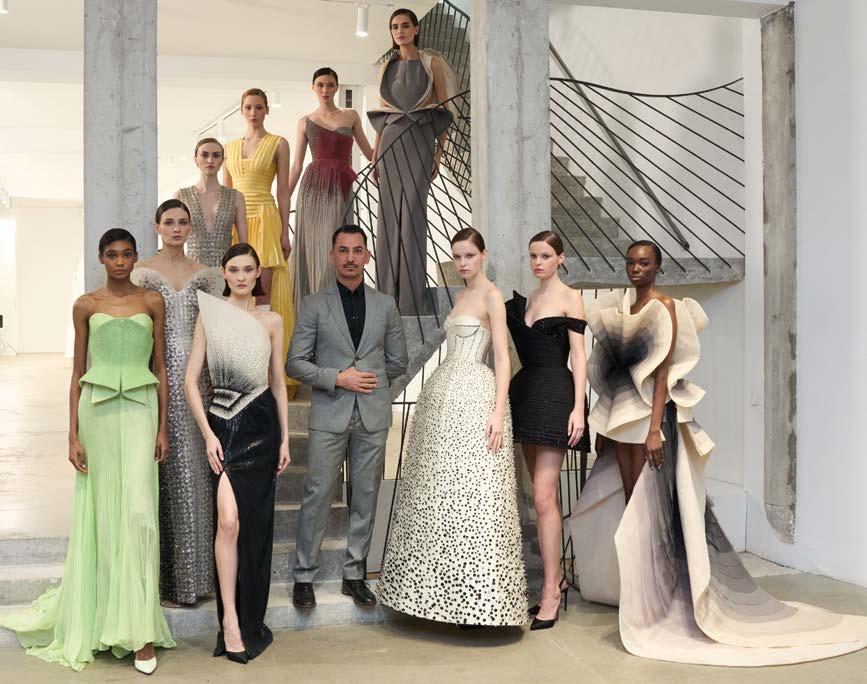

Dubai-based couturier Rami Al Ali has become the first Syrian designer to be welcomed onto the official Haute Couture calendar — a recognition that honors the refinement of his vision and the growing influence of his work on the global stage. He will present his Autumn-Winter 2025 Couture collection in Paris, as part of the official Haute Couture fashion show schedule of the Fédération de la Haute Couture et de la Mode, on July 10, 2025. Originally from Syria, Al Ali has always had a passion for the fine arts. He graduated in Visual Arts from the Damascus School of Fine Arts in 1995 and soon began working in the fashion industry in Dubai and Beirut. In 2001, he
founded his eponymous fashion house in Dubai, still in full development, where he stands out for his bold, architectural designs and unique know-how. For several years now, he has been presenting his collections at fashion shows and presentations in Paris.
Al Ali's creations quickly became a huge hit with international celebrities, including Beyoncé, Jennifer Lopez, Naomi Campbell, Sharon Stone and Aishwarya Rai Bachchan, to name a few.
The Rami Al Ali brand has diversified in recent years with several lines, including Couture, Ready-to-Wear, Bridal Couture, and the White collection. www.ramialali.com
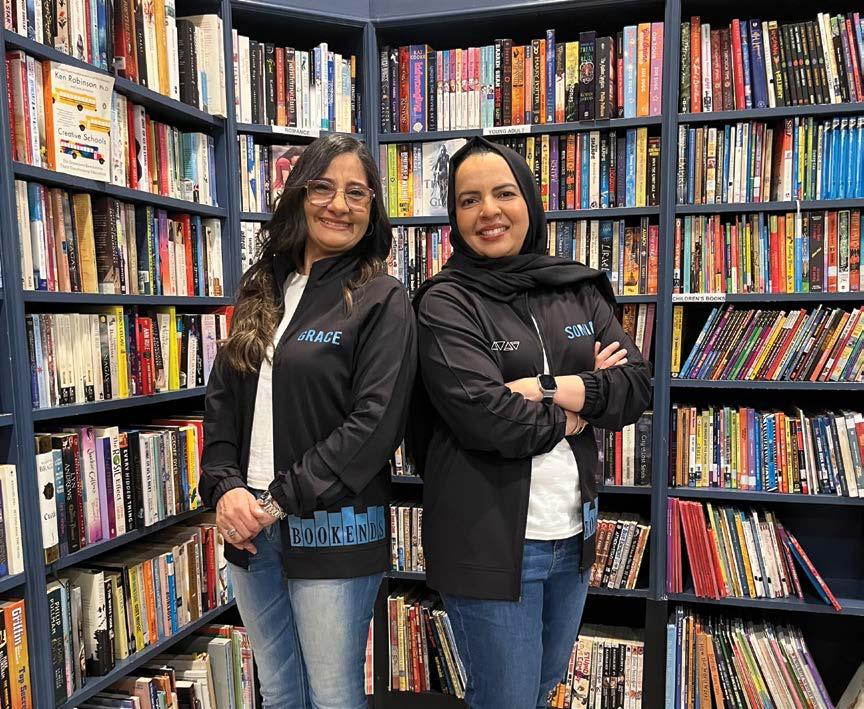
A little over a year ago, in the aftermath of the most devastating rains the UAE has witnessed, UAE-based Bookends saw 14,000 of its books get destroyed. To the co-founders themselves, the extent of the damage felt like a point of no return. But against all odds, here’s how the little bookstore trudged on and emerged stronger than ever. by AALIA MEHREEN AHMED
↓ In April 2024, in the aftermath of Dubai’s heaviest rainfall in 75 years, Bookends faced a severe tragedy: more than 14,000 of its books were destroyed.
Sitting across Grace Chaoul Karim, the co-founder of UAE-based Bookends –and online and physical marketplace for used and “pre-loved” books– in a dimly lit, cosy nook of the bookstore located in Dubai Silicon Oasis, there is a sense of tranquility that one can perhaps find only in spaces filled with novels and stories. But sitting right in the middle of the short wall that separates Karim and I is a framed photograph– it is one where she and her co-founder Somia Anwar are facing a mountainous pile of books drenched in water; all placed haphazardly among one another. That moment was photographed in April 2024, when Dubai experienced its heaviest rainfall in 75 years, and it would later be revealed that a devastating 14,000 destroyed books made up that pile. “I was standing with Somia over there and wondering, ‘Oh, my God, what are we going to do?’ and then Abby, one of our team members who was behind us,
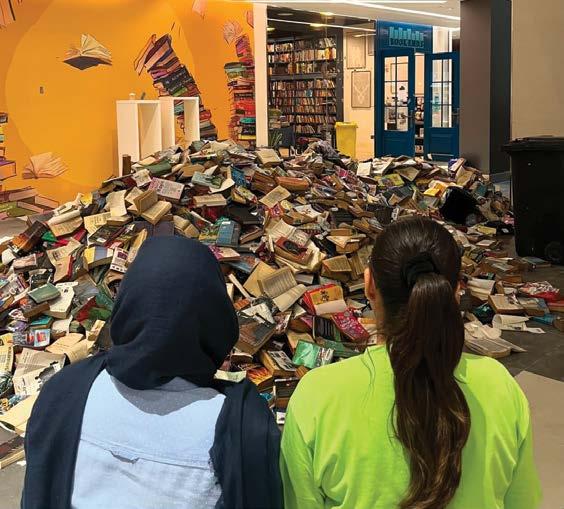
When we put up an announcement on our social media that we are closed, you cannot imagine…the phone never stopped, and the messages on Instagram were unending! We constantly got messages saying ‘Guys, how can we help you? We are here for you. We want you to stand up again.’ And I remember telling Somia how can we consider closing if this is our impact on people? We had to stand up no matter what.” “
said, ‘Ladies, sit down. I want to take a picture,’” Karim recalls. “But I didn’t imagine it would come out so expressively like that. I love it. I get goosebumps every time I see it. Because when I look at this picture, it makes me think of how our lowest moment was a lesson towards resilience. When I look back at it, I know we built resilience from that. Because to stand up again is not an easy task. At that time, our inventory was about 30,000 books. So almost half our inventory was gone. But
we felt we have a responsibility towards our community, you know, and so we had to stand up again. So I’m in love with this picture because it speaks a thousand words.”
That spontaneous decision to showcase a moment of intense vulnerability, and their internal commitment to rebuild for the sake of the community they’d built thus far, culminated into an outcome neither Karim nor Anwar even mildly expected. “When we put up an announcement on
our social media that we are closed, you cannot imagine…the phone never stopped, and the messages on Instagram were unending!” Karim explains. “We constantly got messages saying ‘Guys, how can we help you? We are here for you. We want you to stand up again.’ And I remember telling Somia how can we consider closing if this is our impact on people? We had to stand up no matter what. We had sellers telling us not to worry about their payment balance, and also telling us to use all of it to get back on our feet again. And even here, at the store, when we were taking the rainwater out from inside, we had strangers who came to help us and look after us. It was only then that we realized that our impact is huge. You know, readers…our community is beautiful. This is something I always talk about. If there is something I love about the business, it’s connecting with the people.”
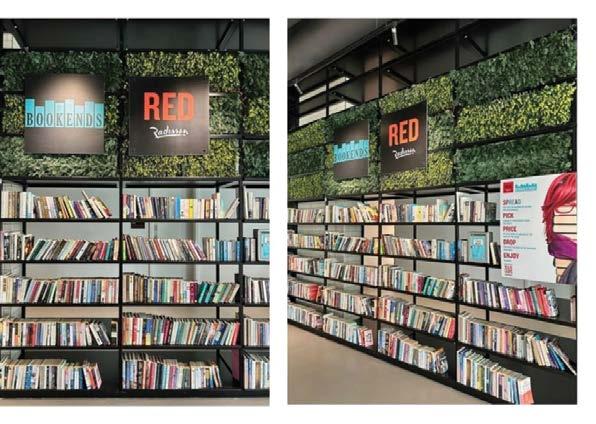
Here, Karim reveals that although Bookends hasn’t gotten its operations back to optimal levels, the support it’s received has been just enough to keep the store up and running again. “Those new shiny shelves you see now were replaced only in December, because even up until then things were quite tough,” she adds. “Imagine, our loss was around AED200,000 during those floods, when we’d started Bookends with all of just AED25,000.”
Indeed, the initial capital Karim refers to is the amount she and her co-founder received when the pair participated in a Startup Weekend event staged at the Sharjah Entrepreneurship Center (Sheraa) in 2019, where they won third place and received a grant of AED25,000 to launch their business. But the seeds of inspiration behind Bookends had been sown much before this competition– in 2016 to be precise.
“Grace and I are friends to begin with,” shares Anwar via email. “So our kids used to be in the same class, and we’d often meet across different events like birthday parties, coffee mornings, mom get-togethers and so on. And every time we met, we would discuss how expensive books are. So around 2016, we started a pilot– we started collecting books from friends, other moms, and even through school fairs. Grace even went to different economic departments in Sharjah, Ajman and Dubai and our idea at the time was to do a mobile bookstore. But we soon found out that
the ecosystem did not even have that category in their system; they did not understand our concept back then. But now you can see how food trucks are everywhere, right? So we decided that while this idea may not be feasible, we could instead consider having a shop. We did a small study and found out something interesting: the idea was never going to make us any money! The plan we had back then wouldn’t have even covered the cost of running a store, so we decided that this isn’t something we want to continue with.”
But all that changed when the aforementioned competition by Sheraa came Anwar and Karim’s way in 2019. “The premise was that Sheraa was on the lookout for book-related ideas which are tech enabled, and so we said ‘Why not present Bookends as an online platform?” recalls Karim, “At that time obviously we were not entrepreneurs, we were not business people, nothing. I remember I was driving my kids to school at seven o’clock in the morning and Somia called me to say that we had to present a one-minute pitch that day, to which I said “What is a pitch?” That was how little I knew about entrepreneurship! I was also so worried about how much we could talk in one minute, you know? But now I believe there is a lot that you can say in that one minute. Anyway we pitched the idea on a Thursday, and by Saturday we were shortlisted. There were more than a hundred ideas, they shortlisted 15 and
“
When we collaborate with hotels and cafes across the UAE, we essentially just have the prices at the back of the books we offer, and each of them has a unique QR code. So if your customers are waiting to be served, for example, they are exposed to different types of literature. They can simply take a book that they like, scan the QR code and buy the book. So it’s based on honesty really…For us, it is about spreading the love of reading across the country.”
Bookends was one of them!”
Having thus got their first taste of what it takes to run a business that weekend in November 2019 –including being introduced to concepts like minimum viable product, business plans, and marketing– the duo’s plunge into entrepreneurship was thus sealed through their third-place win. “That was when reality hit us,” Anwar says. “The first strike of reality was when we realized ‘Oh my God, our idea is good; it is validated!” The second moment of realization was where we realized that this idea wasn’t just talk anymore–we had to get serious. So that was the beginning.”
With the AED25,000 bagged through the contest, Bookends was officially launched in January 2020 out of one of the rooms in Anwar’s house, with the brand’s website serving as the main medium of buying and selling used
books. But less than two months later, in March 2020, the world went into social lockdown because of the onset of the COVID-19 pandemic. “My first thought when that happened was ‘Oh my God, we’ve barely begun the business!’” recalls Karim. “Plus, at the time it was just Somia and me running Bookends. We were entering books into the system, we were fulfilling orders and running operations, Somia was running the ads on Instagram and Facebook… we were doing all of it by ourselves. So the lockdown felt like a huge, huge challenge to overcome.”
But as is often the case with seemingly perilous situations, a sliver of hope emerged. “What we found was that people were very tired of constantly using screens at home and just wanted an escape– and that escape was through books,” Karim explains. “So the business actually started growing, and we had the comfort of running it from my house. You know, for someone like me whose childhood was the civil war in Lebanon, even though the pandemic brought its challenges, I was grateful and counted my blessings. Despite the lockdown, my children could still continue their schooling online, and it reminded me of how there were days I would go to school and not know if I was going to be able to continue my day; if I was going to be back home safe. I remember there were two school years that we did in just a few months in summer. So with
everything happening with Bookends, instead of looking at the empty half of the cup, I was looking at the full half of the cup, you know? I took advantage of being in a situation like that
to rent out a two bedroom apartment which worked both as an office and storage space for us,” Anwar explains through her written responses. “Like I mentioned earlier, the pilot
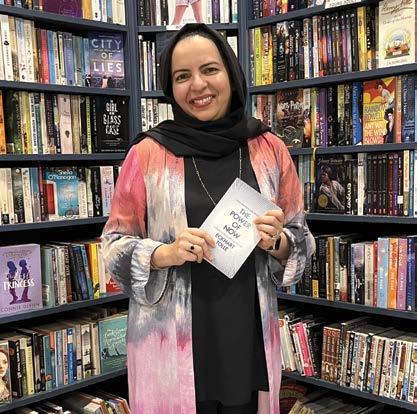
and we just kept moving forward.”
The resilience shown during those initial few months of launching the business resulted in Bookends’ successful growth– both as a business and as a haven of book lovers. Along the way, an additional AED25,000 won through a startup competition hosted by Bank of Sharjah, as well as a COVID-19 grant of US$10,000 offered by Sheraa, helped the business stay afloat. “Eventually the inventory of books we had got too big to run out of Grace’s house, so we decided
test we’d done had shown us that running an actual bookstore wouldn’t be profitable for us. More importantly, we didn’t want to compromise on the prices– books are the only revenue stream for us, but raising their prices would have rendered our business model meaningless. So we were never considering opening a physical store.”
That staunch stance however melted away when, following an ease in social distancing restrictions in mid-2022, Bookends’ customers themselves started to express a keen demand for a physical store.
“We kept getting constant messages, especially in the second half of 2022, with customers saying they wanted to actually actually touch and smell these books instead of just checking them online,” Karim shares. “At the same time, the flat we were operating out of became too small for us, because by then we had 20,000 books on our platform. So I told Somia, ‘I think it’s time to consider opening a store.’ Of course, shifting 20,000 books that have to be in a specific sequence was not going to be an easy job to do. So after searching different locations, we came here, to Silicon Oasis, in July 2023 and found that they were accommodating. So we have at the moment four spaces here— three of them are used as storage facilities and an office, and the fourth is the main bookstore for walk-in customers.”
The launch of a physical location –completely bootstrapped using the co-founders’ own savings– opened doors for Bookends to widen its community impact in more ways than one. In February 2024, the brand was able to set up an unmanned shelf of books at Radisson RED Dubai Silicon Oasis, a hotel located just a few feet away from the bookstore. “When we collaborate with hotels and cafes across the UAE, we essentially just have the prices at the back of the books we offer, and each of them has a unique QR code,” Karim explains. “So if your customers are waiting to be served, for example,
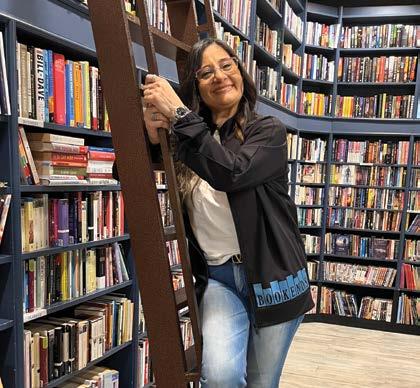
they are exposed to different types of literature. They can simply take a book that they like, scan the QR code and buy the book. So it’s based on honesty really, and we believe that readers will respect the book and will pay for the book. And if you have any one stealing these books, well, those people are simply not interested in actually reading a book. For us, it is about spreading the love of reading and also increasing the exposure to different literature, across the country.”
But just as things started to look up for the bookstore, Karim and Anwar were faced with the biggest challenge of their entrepreneurial journey yet– the April 2024 rains mentioned right in the beginning of this feature.
“The store wasn’t even a full year old yet at the time, and in fact, I remember we used to have conversations about how we should celebrate our
first anniversary– but then the April floods happened…,” Karim says. “In literally less than 12 hours, we were submerged. And I couldn’t have imagined how awful it would be; not until the next day when I came and I saw the amount of water. It was so much that we were not allowed to step into the store for four days. Plus no electricity! So just imagine how awful the situation was. That was when we thought, ‘This is it. This is our end, Finished.’ Because, really, there was no way we could have stood up again. Every penny Somia and I had was in that shop, and at the time we were still paying from our own pocket. Because, you know, opening the store…we had to increase the number of books on our shelves, we had to increase our manpower as well. So our expenses increased along the way. But we kept believing that with time, and with
people knowing us more, they would buy more books and the store would keep growing. ‘We will get there, but we need to be patient,’ is what we used to tell ourselves. But before any of that, this happens? We considered closing for good.”
“But we didn’t realize how great a community we had built until we faced this huge challenge that took us back to zero,” Karim continues. Indeed, the very community whose pleas had led to the physical bookstore being opened in the first place was first in line to offer support in helping put back Bookends little by little. Help also came through the tightknit team Karim and Anwar had built at the store. “Obviously, eventually the shop opened up again, but we couldn’t make any sale and we still had to pay our employees salaries. But it was them who helped us to stand back on our feet. Having a good team around you is amazing– they’re happy in your happiness and celebrate together, and when things get rough, we cry together. It’s amazing. They were here from morning until late at night just to see the business up again. And those shelves, you see? They were changed only in December last year. Because we couldn’t do it up until then. Somia and I also didn’t want to take loans to rebuild the business. So again, it was a matter of taking it step by step. And honestly that photo…it always brings back different memories. For example, on that Sunday after the floods, we had to clear all the books from the
stock online. Because although they were still virtually available on the site, physically they were not available anymore at the store. But again, when we had to remove them, we had our own customers come in and help us. People brought their own tools, we gave them gloves, and together we started clearing everything. Those eventually ended up becoming that pile you see in the photo. And it was during that time I realized how beautiful our community is. It didn’t matter how old you are, or where someone was from, or even if you are a book lover or not– people came from all over the place just to help us out. It was really heartwarming.”
In the little over a year since that tragedy, Karim and Anwar have been able to build the store back to a position of stability. “At the moment we’re selling somewhere from 2,000 to 3,000 books per month, on an average, but we need to sell 5,000 books to be fully profitable,” Karim honestly reveals. “But we’ll get there!”
In a pleasant revelation, between the time this interview with Karim took place and the feature was written, it was announced that a second Bookends store was finally opening– this time in Abu Dhabi, at the Baniyas Coop Society, a UAE-based retail and shopping complex. And at the heart of this expansion continues to be the phrase that Karim says was intentionally chosen to be associated with the brand: pre-loved books. “When you say ‘used books,’ the
perception is that it’s dirty or ugly, and that it’s not to be used again, you know?” she says. “But when you say pre-loved, you are highlighting that there is a story behind that book you’re holding. And you’d be surprised at just how many people look for books with annotations, or highlights, and that’s because they want to connect with the previous reader. It makes them wonder, ‘Why did they highlight that sentence,’ for example? Of course, at the same time, you have people who don’t like to have anything of the sort, so we have books that cater to their preferences too. But that ‘pre-loved’ name came from that concept– that it is a book that has been taken care of. And as you can see around, our books are as good as new!”
Here, Karim points out that the sustainability impact of such a model cannot be underestimated. “When we encourage people to use the same book, imagine how many trees we are indirectly saving and how many books are being saved from being in the landfill,” she explains. “You know, people think that by throwing away just two or three books, the environmental impact is not that much. But those two or three books, if you’re talking about 10 million people, imagine how many books we are throwing in that landfill! So why not give them the chance to be rehomed, find a new shelf, and a new reader? The same book can have a second home, a third home, and so on until it is ready for recycling. At Bookends, we make it a point to not send any books to the landfill. The books that are no longer able to be rehomed, they go for recycling. So, this is one of the main purposes of our store.”
Amid the efforts to put back the store at Silicon Oasis, keeping their partnerships with hotels and other public spaces running, and opening a new store, Bookends’ co-founding duo also found themselves invited to pitch at Shark Tank Dubai. That journey, however, did not end in the way Karim and Anwar would’ve liked– but as has
“
We didn’t realize how great a community we had built until we faced this huge challenge that took us back to zero.”
offered her solace, and the ability to build such resilience and empathy, over the years. “Honestly speaking, no,” she says. “But the books themselves, they were a great escape for me. Like when we were in the shelter [during the civil war in Lebanon], when we had bombs flying over our heads and everyone was just sitting around, I would be reading. I read in Arabic and French mainly when I was a little girl. Now I read in three languages. But I don’t have an attachment to a specific character. I read everything, you know? But my most favorite book ever –one that really made my mind shift– is ‘Start With Why’ by Simon Sinek. But as a fiction, no, I don’t have anything specific. I just read a lot of different stuff because I truly love reading.”
been typical of the duo throughout their entrepreneurial journey, they viewed this rejection too with a glass half full mindset. “It was a very big learning journey that we went through because I didn’t really consider that they would not believe in our business,” Karim says. “Of course I wanted each one of them [the judges] to be a part of our brand, so when all of them said ‘no,’ I was shocked initially. However, the Sharks are right as well because they’re looking for something that is making money very fast. With us, you need patience. So I put myself in their shoes. At the same time, because our operation cost is low, you can increase your revenues with whatever your setup is. So there is a potential of making a good amount of money but it needs patience.”
She adds with a wry smile, “I just figured it was maybe it was too early for us to get into the show. But I don’t regret it. It was a good experience to do a pitch being in front of the camera. And it’s okay they didn’t believe in our business; someone else might. Maybe it’s not today. Maybe it’s not this year. But it doesn’t mean we will stop there. We will continue. 100%.”
At this point, stemming more from personal curiosity than anything else, I ask Karim if there’s been any fictional character or story she’s read that has
It is this love for books that Karim and her co-founder Anwar now hope to continue to spread throughout the UAE and beyond. “My vision is that when you think of a book, think Bookends first,” Karim declares. “You know we want to be on every shelf of readers in the UAE. And after we are well known in the UAE, we want to go to the GCC countries. So our mission is to encourage more reading. So we want to have Bookends present in every home, every shelf. And we want people to go back to reading. Now with the fast pace of our life, people are losing their me-time. You cannot have your own time without being interrupted in any way. But if you are reading an actual book, you are forced to put your phone away. When you’re reading an actual book, you’re not going to have a phone call, or get a WhatsApp message, or some random notification popping out. So you’re going to enjoy your time and this is ultimately what we want people to have. To enjoy their time with books.”
“At this point, I don’t feel Bookends is Somia and Grace anymore,” Karim says on an ending note. “Bookends is about Nora and Abby and Joy. Bookends is about the sellers, the customers. It’s not just us anymore, you know? It’s a community, and this is what I love about it. And this is why we keep going.”
Under the glittering skyline of Dubai, where property ownership often seems reserved for the super wealthy, one entrepreneur is dismantling the barriers piece by piece. Rami Tabbara, Co-Founder and Co-CEO of Stake, is on a mission to make real estate investing as accessible as ordering food or hailing a ride.
“I spent nearly 20 years in real estate, and I kept running into the same wall,” says Tabbara, formerly a Senior Vice President at Middle East property giant DAMAC. “The industry was paper-heavy, expensive, and intimidating. It just didn’t make sense that one of the most powerful ways to build wealth remained locked behind layers of bureaucracy.”
In 2021, at the height of the Covid-19 pandemic, Tabbara launched Stake, a real estate platform built for the digital generation. The idea? Fractional ownership, transparency, and accessibility, all rolled into a user-friendly interface. For as little as 500 dirhams, anyone can now own a piece of Dubai or Riyadh real estate and earn income from it. As its name suggests, fractional property ownership means you can buy a fraction of a property, rather than the whole thing. You benefit from income once the property is rented out, along with any capital appreciation. Stake recently crossed 1 billion dirhams in property transactions and has over one million users from across 210 countries.
Launching a property startup in the middle of a global pandemic might seem like a gamble. For Tabbara, it was the challenge he had been looking for. “Dubai’s market had frozen, rents were falling, expats were leaving — it was chaos,” he
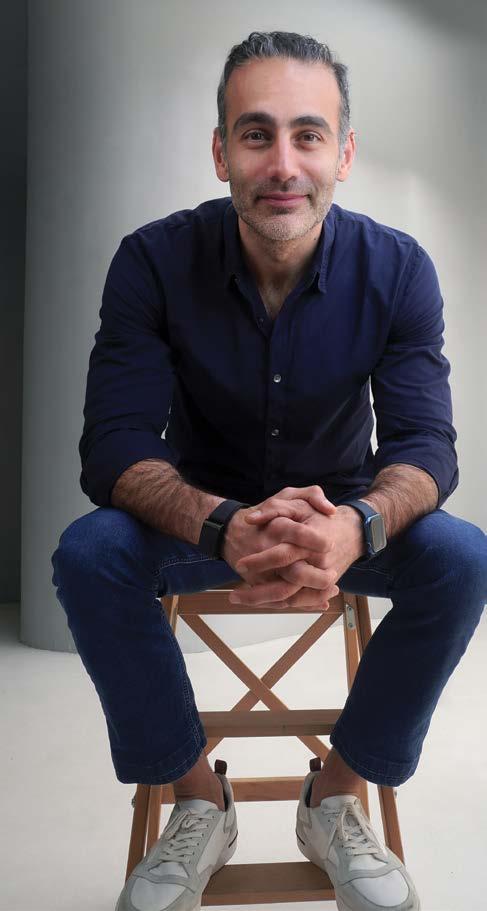

“
WE’RE GIVING
THE
TO PARTICIPATE IN MARKETS THAT WERE ONCE ONLY AVAILABLE TO THE ULTRA-RICH OR BIG INSTITUTIONS.”
recalls. “But that forced us to build with discipline. We focused on trust, regulation, and compliance from day one. That’s why we’ve been able to grow sustainably.”That foundation has paid off. Stake is now licensed by both the Dubai Financial Services Authority (DFSA) and the Saudi Capital Market Authority (CMA). It’s also Shariah-compliant — another barrier removed for global investors.
Another challenge he faced was explaining to potential investors how fractional ownership works. “When we explain it to new users, we tell them it’s like buying shares in a company - except the company is a property,” says Tabbara. “You earn your share of rental income, benefit from appreciation, and you can do it all from your phone.”
Stake’s numbers speak volumes. Over 420 properties have been funded, 35 million dirhams has been paid out in rental income, and more than 250,000 investments have been made.
Retail investors can invest up to $100,000 annually, with a maximum ownership cap of 33% per property to prevent monopolisation. Those with a verified net worth over $1 million can exceed that limit — and even qualify for a UAE Golden Visa via Stake with a minimum 2 million dirhams investment.
While other platforms scale by quantity, Stake opts for quality. “We’re not a traditional marketplace. Every property we list is handpicked, analysed, and underwritten,” says Tabbara. “We work with top brokers and asset managers to source the best performing assets — if it doesn’t meet our yield and risk criteria, we don’t list it.”
In 2024, the company introduced its highestyielding product to date — the Fix n’ Lease fund - and expanded into Saudi Arabia, becoming the first platform licensed by the CMA to offer real estate access to global investors. Within five months, it launched three private funds in Riyadh, attracting SAR 135 million in foreign direct investment from over 10 countries.
With its regional footprint established, Stake has its eyes on a global rollout. New asset classes, new geographies, and crypto payments are all on the roadmap. “We’re working on enabling crypto as a payment method. Many of our users, especially outside the GCC, prefer it. But we’re taking a compliancefirst approach,” Tabbara explains.
That compliance-first mindset has also attracted heavyweight backers. Stake is supported by Aramco’s Wa’ed Ventures, Mubadala Investment Company, and Al Jomaih Holding, a sign of confidence from some of the region’s biggest institutional names.
Democratising Wealth, One Stake at a Time For Tabbara, the mission goes beyond just property. “We’ve democratized access to wealth creation,” he says. “We’re giving people the chance to participate in markets that were once only available to the ultra-rich or big institutions. And we’re doing it with full transparency, clarity, and accessibility.”
The idea behind fractional property ownership has made its way into the world of crypto and the blockchain, with real estate tokenization. Dubai Land Department and Prypco recently launched a pilot scheme offering stakes in properties starting at 2,000 dirhams each.
Stake has been in active discussions with the Dubai Land Department (DLD) and digital assets regulator VARA and is currently working to align its platform with the new regulatory framework around tokenized real estate. “We expect to participate in the second phase of the pilot program, which is scheduled to go live in Q3 or Q4 this year,” adds Tabbara.

Justin Harper is an award-winning business journalist and editor who has worked across four continents and for the biggest names in media, including the BBC, FT Business, Daily Mail, and others. He is the co-founder of The Crypto Radio and an experienced podcast host.
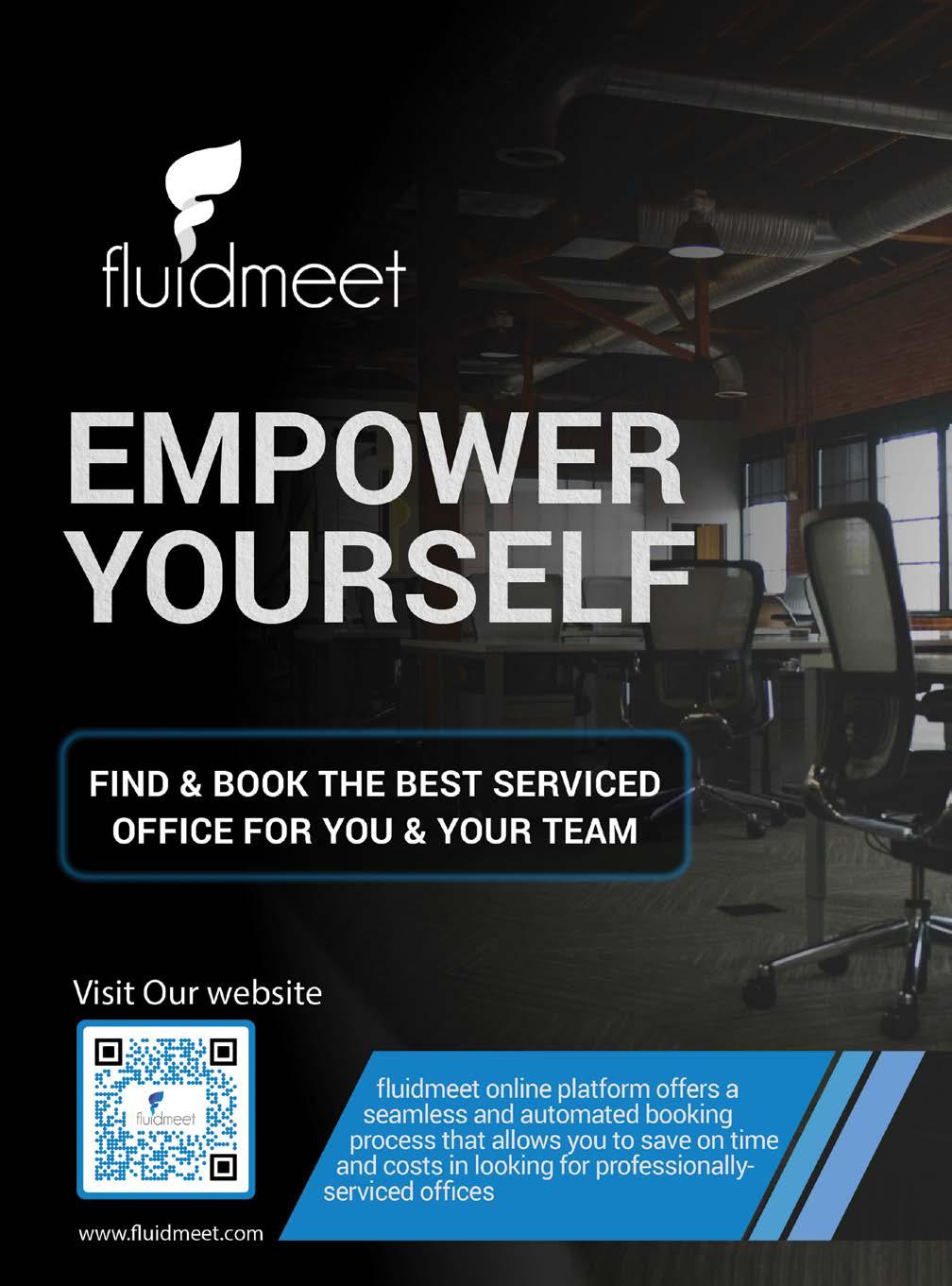
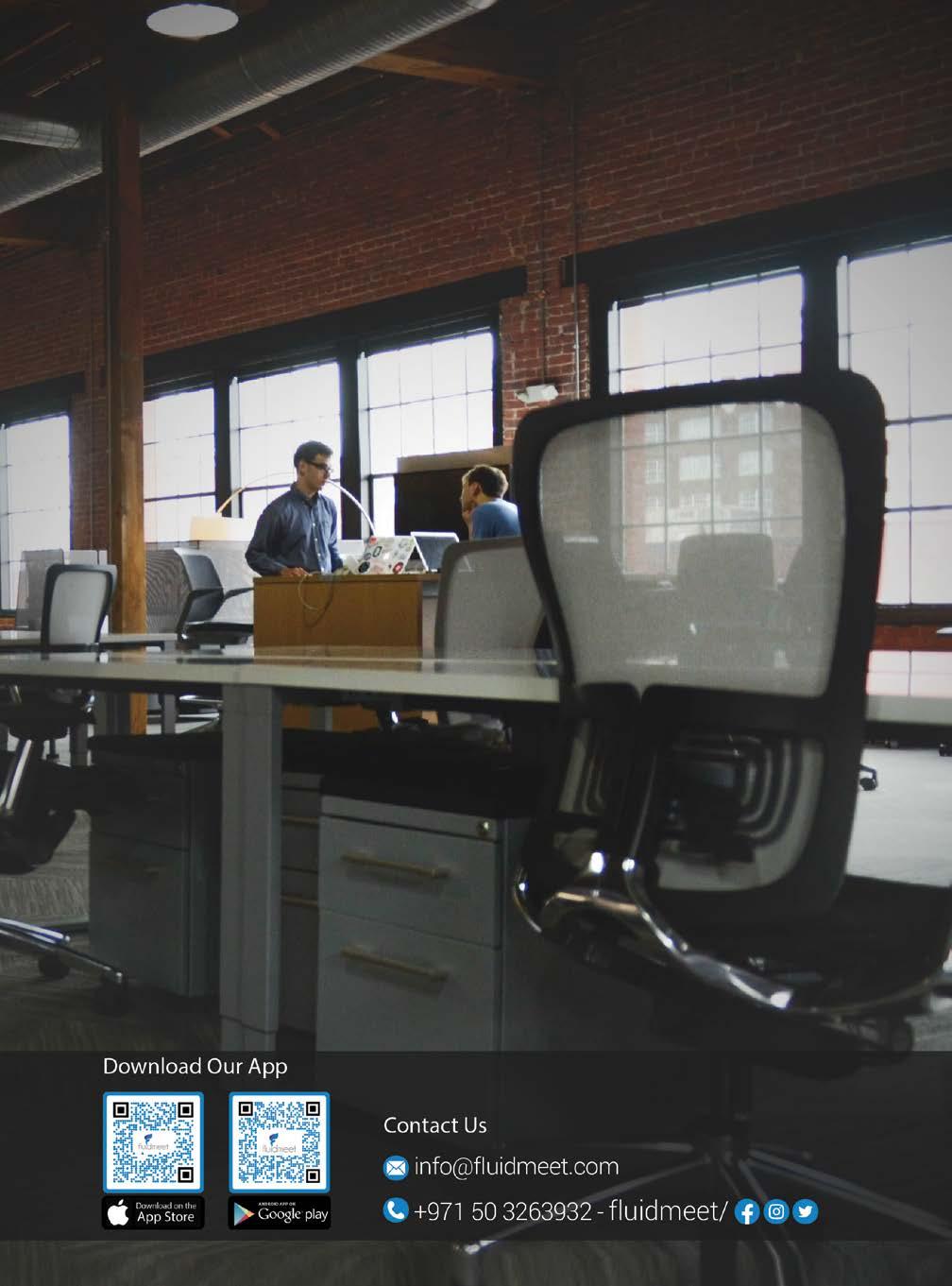
Dubai-based AI hub offers real-world testing ground across billions of data points, 90+ schools, and 200,000 students around the world
GEMS Education, the UAE-based world’s largest private Kindergarten-Grade 12 education provider, has launched the Global Education AI Hub, a new initiative that invites leading minds in artificial intelligence (AI), education research, and edtech innovation to help transform how learning is delivered across schools worldwide.
Headquartered in Dubai and embedded within GEMS’ growing innovation ecosystem, the Hub aims to co-develop and scale real-world, ethical, and inclusive AI solutions from
personalised learning and intelligent tutoring systems to school operations, wellbeing, and curriculum design.
With access to GEMS Education’s 90+ schools around the world, 200,000 students, and 15,000 teaching staff, billions of unique data points, spanning multiple curricula and geographies, partners will have an unprecedented opportunity to pilot and refine their innovations in live, diverse classroom environments.
“AI has the power to elevate how students learn and how schools function – but only if it is designed with care, ethics, and deep
understanding of realworld classrooms,” Sunny Varkey, Chairman and Founder of GEMS Education, said. “We’re calling on the best minds globally to join us in shaping a more personalised, inclusive, and impactful future for all learners.”
The Global Education AI Hub will provide:
}Secure access to anonymised data and insights from GEMS’ diverse education settings
}On-the-ground collaboration with GEMS School of Research and Innovation, its flagship AI-enabled school opening in August
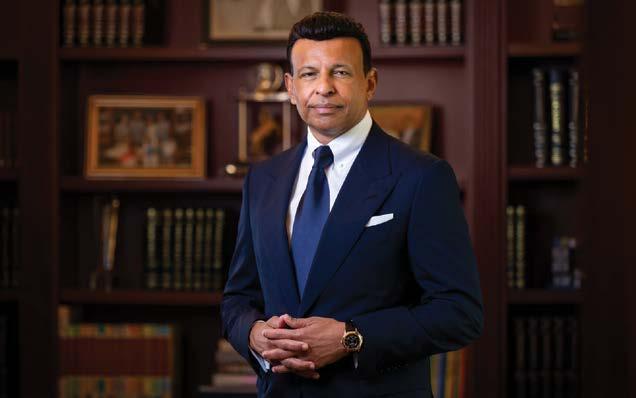
}Deployment and scaling support via GEMS’ network and future international hubs
}Ethical governance and high-fidelity testing infrastructure
}Recognition and visibility as a founding innovation partner
“AI’s potential in education is immense but only if built responsibly, and evaluated where it matters most: with students and teachers,” Baz Nijjar, Vice President –Education Technology and Digital Innovation at GEMS, added. “Our Hub is designed to empower the world’s top innovators to do just that. Whether you’re developing a tutoring engine, a wellbeing algorithm, or an operational platform, we offer the infrastructure and access you need to make it real – and make it scale.”
Partners may collaborate through either philanthropic or commercial pathways, with opportunities to develop open-access tools or co-create proprietary solutions with global impact.
Those interested in becoming a founding partner of the GEMS Education AI Hub, can reach out via aihub@gemseducation.com
